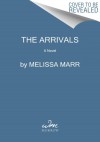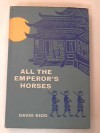brokenbiscuits
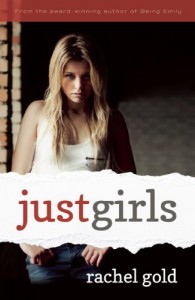
My favorite thing about this YA/New Adult novel is how meta it is. An I-think-cisgender-but-I-can’t-remember-why-I-think-so-or-did-I-just-assume-this? author writing about a transgender character and a cisgender character who is telling people she is transgender. I loved Gold’s previous novel Being Emily, and the main characters Emily and Claire appear in this book... and they have written a memoir called Being Emily. It’s Emily-ception, my head is exploding!
So this story takes place at a college in Ohio and has two main characters: Ella, a geeky, femme, rich gamer/science girl who is transgender and bi/questioning, and Tucker, a feisty, lefty, working-class butch Humanities girl who is cisgender and an out lesbian. Because she has kind of a hero complex, Tucker decides to defend/protect the unknown trans girl in her dorm by saying she Tucker is that girl, and then she becomes the target of a lot of transphobic abuse on campus. In this way the author sidesteps the seemingly-obligatory violence-against-trans-teen scene by making it happen to someone else. (I say seemingly-obligatory because it’s very very common in YA with transgender characters, and I get why that is, but it harshes my mellow, and any change is as good as a holiday.) It’s certainly a way out I would never have thought of in a hundred years. However, the burden has just shifted over to poor Tucker. TW for violence, dating violence and sexual assault.
Anyway, Tucker and Ella become friends, then roommates, then closer friends, and then some sparks fly between them... but the romantic element of this book is a lot more complicated and realistic than this partial synopsis suggests, which is part of the awesomeness. Actually the romance/love triangle element reminded me of Adaptation by Malinda Lo. And there’s a part where Ella and Tucker and their friends use gaming for activism, which reminded me of Cory Doctorow. Since I love Malinda Lo and Cory Doctorow, this is some pretty high praise. But speaking of the romantic element, it gets pretty spicy, in a good way, but that plus the college milieu makes it more NA than YA, and not something that most people would feel comfortable having their grandmother read over their shoulder.
I’m going to get a bit more spoiler-y here. There are a lot of things in this book that were potential hazards but were very delicately and tastefully handled. And then a few other places in the book where I could pick it apart and complain about why did the author use this word or that word. But you know what, that’s the easiest kind of book review to write, and kind of boring, and I’m sure someone else out there has got it covered. The one thing that I did want to mention that seemed a little facile to me was that after one of the characters is raped, everyone universally urges her to report it to the campus authorities, and I definitely see two points of view about that. Then there’s a pretty swift and fair process of justice and the rapist ends up being expelled. That is so not how things happened in sexual assault cases at my university in the late nineties, and I’d like to think things have changed so much, but it’s kind of hard to believe. But I’m the one who doesn’t want uber-depressing books for QUILTBAG youth so why am I complaining?
Overall, despite the slew of bad things that happen in this book, there’s a real sense that everyone is basically “good people” and this is shown in a lot of ways. There are a lot of people who don’t know anything about transgender issues, and then they are educated, and then they are allies, as simple as that. Or there are a couple characters who are in conflict with our main characters, but then they realize they have common interests or it was all kind of a miscommunication. Two people who have both been abused by the same person have been pitted against each other in the past, but once they realize, they immediately help each other. Everyone is so nice except for a few baddies who are cartoonishly evil. (Honestly, I love characters like that; I know it’s not supposed to be good writing but I think that’s just a fad and evil characters are my favorite.) This “niceness” also manifests in a couple ways which seem more negative to me. There’s a neat character Nico who is genderqueer who is Ella’s friend, and when Ella’s new friends at the university meet Nico, they will not stop trying to find out what gender Nico was originally assigned. This is never revealed, which I thought was great. But, to me, the friends’ nonstop questioning was pretty horrible. But Nico doesn’t care. Actually all the characters are ready to educate anyone at any moment and they don’t mind being questioned. Then for the whole book I was waiting for someone to say to Tucker something like, I understand you mean well and you were trying to be noble, but it’s not cool to appropriate an identity that is not your own. This never ever happened. It was all, Thank you, Tucker, you’re so great. In general, I really really like it when my expectations for a novel are thwarted and the plot does not go the way I expected, and this happened bigtime here, so I take my hat off to Rachel Gold for all this. Finally I decided that this weird quality I couldn’t understand where everyone is so nice and eager to educate each other is because... they are from Ohio. People do NOT behave like this in downstate New York, no way no how. But maybe people are really like that in the Midwest?
Theme song for this book? I am going to have to come back to this later because I am really really drawing a blank.
Quite aware of what they're going through
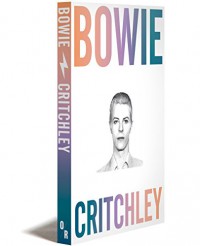
Not a pop star biography, this is a loving philosophical investigation into the underpinnings of David Bowie’s many personas and why he has exerted a practically lifelong fascination over the author. Predictably my favorite elements of this book were the parts where the author talked about his own life and what individual Bowie songs meant to him. Like you would expect, Critchley covers gender, sexuality, creating identities, and dystopias. But what was different from everything else I’ve read about Bowie was the material about narrative identities and how Bowie “breaks superficial conventions between authenticity and truth.” Critchley explains how David Bowie uses utterly constructed, self-conscious fakery to be original and convey deep emotional truth, with just one example being an anecdote about how Robert Fripp watched Bowie trying to generate exactly the right emotion in his voice, playing the loop and trying different things over and over.
This same dynamic was unconsciously illustrated in a description of how David Bowie didn’t attend his brother Terry’s funeral after his death by suicide, because he didn’t want to turn it into a media circus. Critchley says, “The note on Bowie’s bouquet was extremely poignant: ‘You’ve seen more things than we can imagine, but all these moments will be lost—like tears washed away by the rain.’” My reaction to this was, yeah, it’s extremely poignant, especially if you’re a fan of the movie Blade Runner, since Bowie’s note is an unabashed rephrasing of Rutger Hauer’s character’s dying speech at the end, minus the bit about space travel. Always a pose to tell a true thing. Also, it’s worth noting that I had to look up what year Blade Runner came out and make sure it was first, because Bowie is such an influential icon that I thought it wasn’t out of the question that the screenplay writers were copying Bowie instead of the other way around.
What other book is this like? Every other book about David Bowie, but thankfully not too much so. Okay, it was also kind of like Uncommon: An Essay on Pulp by Own Hatherley
Theme Song? “The Secret Life of Arabia”
Show Trans by Elliott DeLine
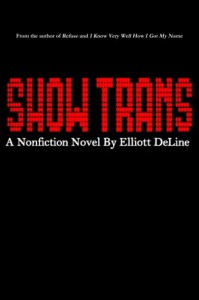
Show Trans has been my favorite book of 2014 so far and there’s not too much time left for another book to come along and steal the prize. Show Trans is a memoir about: being transgender, Grindr hookups, losing time, being dissociative, a trip out West, unrequited everything, the search for intimacy, writing novels based on real people, casual sex work, STDs, transphobia from medical practitioners and the world at large, having a non-binary gender identity, sex addiction, and finding a partner. I really love recovery memoirs, but this was no typical recovery memoir. It was better.
In a lot of memoirs, when people think about their own story they frame it as a narrative identity where bad things happen and they persevere and it all makes sense. But real life doesn’t work in this orderly way as far as I know. I also think whenever people come to a new conclusion about their identity they want a narrative to go with it so they recast everything that ever happened to support their new identity. And everything is viewed through the prism of identity so a different set of things become important and unimportant. But DeLine does not play along with any of this. He presents life as it actually is, which is picaresque, nonsensical, and almost completely inside one’s own head. He takes on, or recognizes, a number of new identities in this book but he won’t recast the narrative. It’s just one damn thing after another, in the best possible way. So maybe that is one reason why this book is a non-fiction novel, not a memoir.
You know how they say a fox knows many things but a hedgehog knows one big thing? One big thing is boring. DeLine is a fox, not a hedgehog. I think this is my favorite quality of his writing. I believe anyone who likes literature that defies a few of the usual customs of writing to deliver a very real experience would love this book. I kept thinking, “In the future when the world is less transphobic, everyone will recognize Elliott DeLine as a really amazing writer.” And then, “No, wait, can’t we just cut to the chase and recognize this right now?”
In Show Trans, DeLine tells a very personal story including painful, intimate details and it feels raw and true. But he never goes a step too far and over-shares. That is a very delicate balance and I really admire the way he did this. There is a strong sense of personal dignity and integrity deeply woven into the fabric of this book. Why should he explain everything? If he really were the Show Trans of the title (like a show pony), he would display everything to gratify the audience’s prurient curiosity or to “educate” them. But that’s not what this is about. DeLine writes as if his audience is smart and can figure things out without him explaining every little thing, and I like that subtlety. This is also not an “emotion recollected in tranquility” kind of story. It’s more of a “This all happened recently; emotion recollected in more emotion” kind of story. This makes it more impressive to me that DeLine is able to sift through what needs to be told with such discriminating prudence.
The one thing I was worried about before starting the book was that there would be disturbing sex scenes, because I’m a fragile squeamish flower. But it was no problem at all; these scenes were distressing but not graphic, making it a powerful book with a low ick factor. I guess part of the reason is that if the narrator is totally dissociated and not really present then there’s nothing to describe, is there? But it wasn’t just that, it was mainly excellent writing and good judgment. On the other hand, the medical scenes were truly harrowing. I have an extremely low opinion of medical practitioners and I expect them to be transphobic and cis-normative (as well as everything else that is bad.) But the treatment that DeLine received was so appallingly criminal and medieval that it was shocking. This book is a damning indictment of the medical-industrial complex!
Book design: I don’t talk about that anymore, which is a shame because this book is very pretty and even has photos.
What other book does this remind me of?: They’re actually not that similar, but how about Gender Failure by Ivan Coyote and Rae Spoon, another great non-binary transgender memoir of 2014?
Theme song: Trouble Loves Me by Morrissey
Kevin
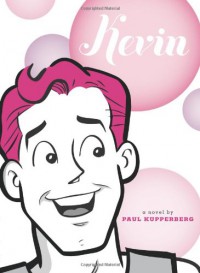
I read this book over a period of about a month. I left it in the basement and every day while I was waiting for my cat to finish eating so I could give her an insulin shot, I would read a few pages. It was perfect for this purpose and I wish I had another book like this now.
Things that might disappoint you are:
-This is not a comic/graphic novel.
-It is not really set in the Archie universe so you won't see much of those beloved characters. There's a framing device where Kevin is telling the gang about when he was in middle school in a different town.
-No romance/boy on boy action of any kind, no kissing, no talking about crushes, no "I really like you," nothing!
But you might really like:
-The "gee whiz!" tone is very in keeping with all the "serious issue" Archie comics of the '70s and '80s. Although it deals with homophobia, bullying, parental neglect, and suicide, it's incredibly light and positive. I would have been in love with this book when I was eight years old because it covers important topics but in a very gentle and sugar-coated way. So keep this in mind for the bright but delicate children in your life.
Everything Leads to you

What I liked:
-LA setting, especially because I was on my way to LA when I read it.
-General air of glamor and decadence. The MC leads a delightful life where everything goes her way, except for a few interpersonal problems here and there.
-Sweet, light lesbian love story.
-Different from a lot of other YA books because school and parents are a total non-issue for the MC. The character seemed old for 17 (or 18, I forget), which I bought while reading the story, but it almost seemed as if the novel should have been about a 22 year old. I bet there's an interesting story behind how this came to be a YA book.
What I didn't like:
-The cover! Since the book is about a brilliant young designer who helps create the sets for movies, the cover should have reflected that with a gorgeous, atmospheric design. Instead it was boring and generic and tells you nothing. Even the font disappointed me. I also think it's a mild case of white washing. I don't remember the main character's appearance being described, but it is mentioned that she is biracial (three of her grandparents were white, one was African-American) and light-skinned. That doesn't make me think: ivory skin and straight blonde hair. The copy I read was an ARC that I got for free at the Rainbow Book Fair (Penguin Random is so fancy they didn't sell books, they just gave them away)--so I was positive the real cover would be better. But it's the same.
That is all.
And no reason to talk about the books I read. But still, I do.

 When I was working on my Best of 2013 and 1913 posts, I planned to include a “to-be-read” section. It would list the books that were published in 2013 that I was interested in reading but never got around to. I was going to call it “These could have been the best books of 2013 if only I had read them.” I came up with 31 books before I realized that this list was already too long and therefore incredibly boring. (Even now part of me is still tempted to curate this list into a top ten, but what would that be? Best Books of 2013 I Did Not Read? Books of 2013 I am most likely to in fact still read?) At that moment I was suddenly struck by my strange relationship to making lists of books.
When I was working on my Best of 2013 and 1913 posts, I planned to include a “to-be-read” section. It would list the books that were published in 2013 that I was interested in reading but never got around to. I was going to call it “These could have been the best books of 2013 if only I had read them.” I came up with 31 books before I realized that this list was already too long and therefore incredibly boring. (Even now part of me is still tempted to curate this list into a top ten, but what would that be? Best Books of 2013 I Did Not Read? Books of 2013 I am most likely to in fact still read?) At that moment I was suddenly struck by my strange relationship to making lists of books.
So first of all, where did I get these 31 titles from? Why, obviously it was culled from a much longer list of books I would like to read. I counted and there were 187 books on that list. Theoretically I could get through all those books in a year, but I absolutely won’t, even though they’re supposedly the books I want to read. Some of those books have been on that list for many years. I feel oppressed by that list because it’s so damn long. In fact, less than one year ago I did a massive “Selektion,” keeping some books on the list but sending many others to the metaphorical gas chambers. (Yes, that’s how guilty I felt about it: I was picturing myself as an SS officer. Any other time I picture that scenario, no more than once a day, I am a camp inmate. This is probably because I’m Jewish.) Since then, the list has burgeoned again, which explains the high proportion of 2013 books on the list.
Why am I ADD about everything else in my life but OCD about books? (And OCD about thinking about the Holocaust?) These days I try to stay away from “What is the point of. . .? Why am I doing. . . ?” questions because the answers are always the same. (“There is no point, things don’t have a point.” “There is no reason, this is just something you’re doing and stop worrying about it.”) I know a lot of things are beyond my control, but maybe not this thing. Making lists of books is not actually an autonomic life function like breathing or pumping blood, as much as it may seem that way. So I could stop if I wanted to. Is the first step admitting that I am powerless over making lists of books?
I remember a more innocent time before the internet, when the only way I ever knew about books was if some human being talked about them to me with their actual mouths or if I saw a review or ad in some sort of magazine or newspaper. I got most of my books through browsing in the library or the bookstore. Now my browsing is done online and then I either put them on hold at the library or buy them from Powells or Charis online bookstores, or ABE or Alibris in a pinch. Back in the day I did have a list of books I wanted, but it was very short, and I kept it in a notebook. Even then, it sometimes took me many years to read a book on my list, but that was mostly because at that time it was harder to find any specific out-of-print book. I remember when I was a teenager my friend S. recommended a book called Come to Mecca and other stories by Farrukh Dhondy. (This recommendation may even have been made via handwritten letter mailed with a stamp!) The book stayed on my list for, oh, at least five years. I finally read it, liked it a lot, and told S. about it. She did not remember anything about the book and refused to believe she had recommended it.
The upside of the way we discover books now is that I come across books that will never be reviewed in a big periodical. Five of my favorite books of 2013 are not in my local library system because they are either from a small press or self-published. So it’s not that I want to turn off the internet (okay, well actually I kind of do.) The problem is on my end, the list making end.
I actually don’t like to read as much as I used to. I think in some way reading about books has replaced actually reading books as the satisfying activity. I read about a book, it sounds so very interesting, and then I put it on my list, which in some way mentally checks it off. Resolution has been achieved, and some sort of endorphin is released. Why would I want to actually read the book? It would take hours and I might not even like it after all.
One thing I actually still like is reading and briefly reviewing the books of one century ago. In fact, my fantasy is that someone would pay me to do that. I say this in the spirit of putting my intentions out to the universe, which as I understand it means that my intentions will magically come true because it turns out the world is a wish granting factory after all. I have in mind a classy periodical like The Chronogram. Or, perhaps a brand new magazine, devoted solely to the books of a hundred years ago. Every month there would be a different author on the cover. (Although probably it would mostly be P.G. Wodehouse, L.M. Montgomery, Arnold Bennett, Baroness Orczy, E.F. Benson, and L. Frank Baum over and over. The way David Bowie has been on the cover of Uncut magazine nine times, about 5% of all their covers. But Uncut has had women on the cover only seven times, total. My magazine would have female-identified writers on the cover every other month, at least.) I guess I’m not averse to a single, really high quality issue per year. Wealthy Edwardian-literature-loving visionary publishing dilettantes who share my dreams, contact me.
All right, I got a little off-topic here. Let me tell you how my genius girlfriend solved my list-making problem for me. I had all kinds of ideas but hers actually worked. She told me to use a Bannanagrams rule where if I want to add a new book to the list I have to delete three others. It’s been working wonderfully. If I ever get through all the books on the list, you will hear about it.
 a more innocent time before the internet
ADD about everything else
arnold bennett
bannanagrams
baroness orczy
best of 1913
best of 2013
but OCD about books
come to mecca
david bowie
farrukh dhondy
i am powerless
l. frank baum
l.m. montgomery
making lists of books is not actually an autonomic
my first attempt at a personal essay
my girlfriend is a genius
my strange relationship
p.g. wodehouse
selektion
sister i'm a poet
the world is not a wish granting factory
things don't have a point
to lists of books
uncut magazine is sexist
wealthy Edwardian-literature-loving visionary publ
a more innocent time before the internet
ADD about everything else
arnold bennett
bannanagrams
baroness orczy
best of 1913
best of 2013
but OCD about books
come to mecca
david bowie
farrukh dhondy
i am powerless
l. frank baum
l.m. montgomery
making lists of books is not actually an autonomic
my first attempt at a personal essay
my girlfriend is a genius
my strange relationship
p.g. wodehouse
selektion
sister i'm a poet
the world is not a wish granting factory
things don't have a point
to lists of books
uncut magazine is sexist
wealthy Edwardian-literature-loving visionary publ
Best of 1913, 1813, and 2113: Final installment

The Brave Adventures of Lapitch by Ivana Brlic-Mazuranic
A sweet, lovely children’s book about a cobbler’s apprentice who leaves his abusive master and sets out to seek his fortune, having many adventures along the way. As the story explains, Lapitch is cheerful as a bird, brave as a knight, as wise as a book, and as good as the sun. I can see why this is a Croatian classic.
Wet Magic by E. Nesbit
A family of brothers and sisters and the urchin they befriend encounter a mermaid who brings them to a magical underwater kingdom. My favorite part was the first half, set in our regular world. I noticed a bunch of reviewers on Goodreads saying the same. Considering that E. Nesbit was a radical Marxist, I was surprised by her obsession with royalty and how much better they are than anyone else. There was a part where the children had to fight storybook legends who were on the side of evil. The storybook legends had no power if the children didn’t know them, so I would have been super-helpful in this fight because I’d never heard of any of them. All the storybook legends were male except for a generic horde of Amazons. Trite racist trope: boy stolen by gypsies. Otherwise charming.
The Flirt by Booth Tarkington
In possibly one of the earliest examples of a movie tie-in, the copy I read was a 1931 reprint containing photos from the movie version. (The Bad Sister was based on The Flirt and is notable for being Bette Davis’ screen debut, with a minor role for Humphrey Bogart. What’s hilarious is that not only do the movie characters have different names than the characters in the book, nothing portrayed in the movie photos happens in the book at all.) This novel has that classic device of two sisters, one good and one thoroughly bad. The bad sister uses her feminine wiles to steal all the men and get everything she wants. There’s also a kid brother, who was my favorite character because he sees through everyone, plus he’s a bully who then gets bullied himself. I also enjoyed the witty, doomed, alcoholic character Richard Lindley and the con man character. The bad sister has to be punished at the end, which is kind of a downer. There was no room in 1913 for a woman to be anything but a saintly pushover. Other than that, a fun read. Downfall: racism against a stereotypical manservant character.
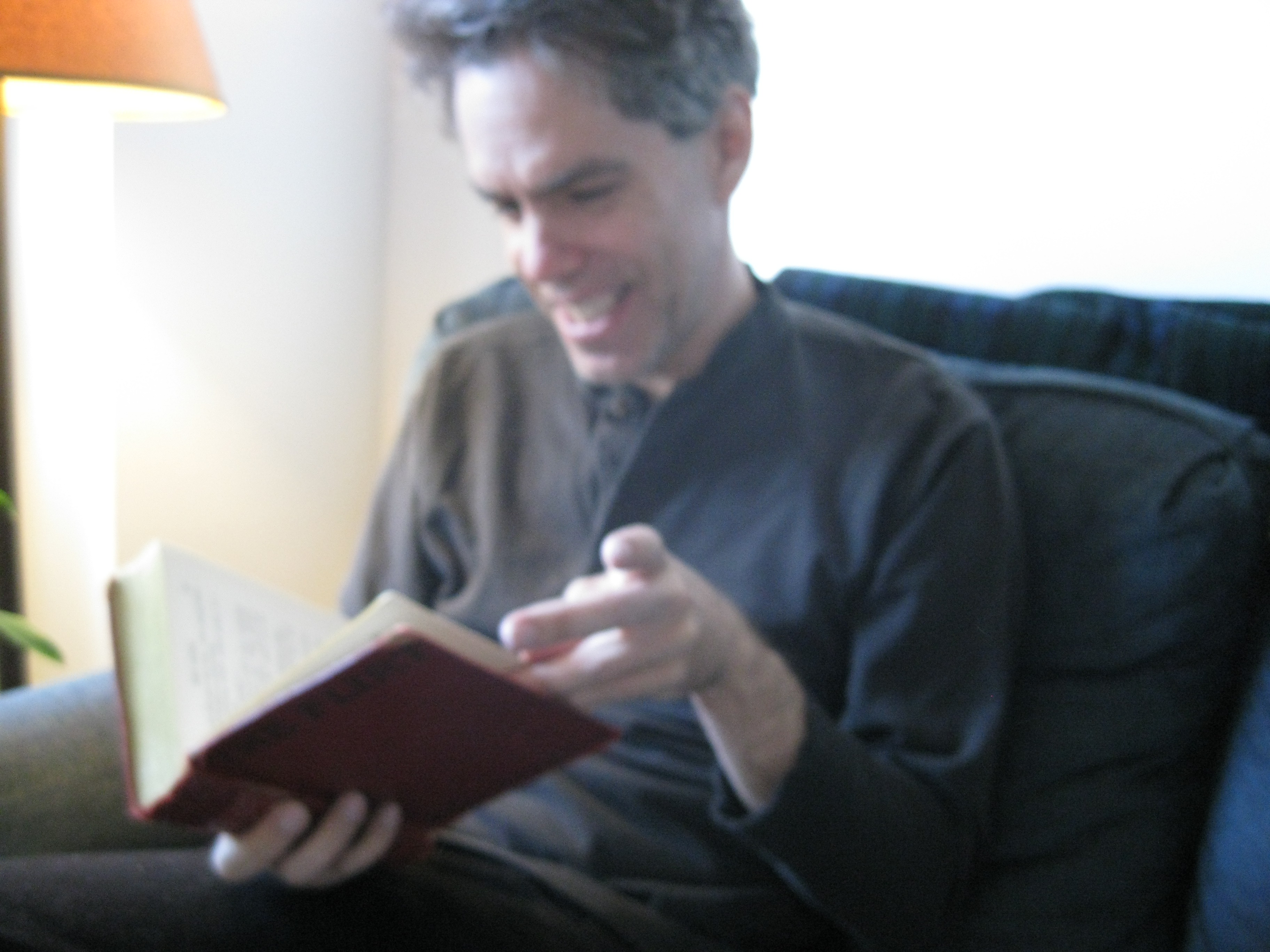






The Custom of the Country by Edith Wharton
Undine Spragg, a vain, self-involved woman from some hick town, climbs the social ladder, oblivious to the body count she leaves along the way. I probably would have enjoyed this book more if I hadn’t just read The Flirt, which has a similar plot and theme but is more light-hearted. Other than Undine’s son, there weren’t really any characters I felt sympathy with. Edith Wharton is a great writer but I just felt vaguely oppressed while reading this one.
When William Came by Saki
I didn’t enjoy Saki’s 1911 offering, so I was going to skip this one, until I read the plot description and realized it was speculative fiction. This novel is set in a world where Germany has conquered Britain! This fascinated me, and it was clear that Saki was the only writer who saw World War I coming, so I had to read it.
Saki’s prose is witty and crisp; here’s an example: “Plarsey had never been able to relinquish the idea that a youthful charm and comeliness still centered in his person, and labored daily at his toilet with the devotion that a hopelessly lost cause is so often able to inspire. He babbled incessantly about himself in short, neat, complacent sentences, and in a voice that Ronald Storre said reminded one of a fat bishop blessing a butter-making competition.” It’s Saki’s usual satire of high society, except this time his aim is to roast England for being insufficiently militaristic. The idea is that soft Britain was completely caught off guard and was unable to defend itself against a German invasion.
All the spec fic elements are great, especially his descriptions of how the German overlords changed the public parks in London. (They spruce up Hyde Park but add tacky public art, like a statue of Alice in Wonderland, just like what we have in NYC.) Saki foresaw the Hitler Youth phenomenon by a couple of decades with his description of Germany’s attempt to win over the young people via the Boy Scouts. You have to read the book to find out if this works or not. All the British aristocrats are lazy and muddle-headed and just want to go on with their lives as usual even though their country has been annexed. There are two main characters, a husband and wife. The wife, Cicely, is a beautiful woman who only cares about her own pleasure, very similar to many other female characters in the books of 1913. Her husband, Yeovil, is very worked up about the fait accompli, which is what they call the take-over, but may be lulled into apathy by the delights of upper class British country life (hunting and riding and other outdoorsy things.)
The downfall of this book is the same as last time: anti-Semitism. Cecily is going to have a piano player visit, and her husband asks, “Not long-haired and Semitic or Tcheque or anything of that sort?” “There are even more [Jews] now than there used to be,” says another character. “I am to a great extent a disliker of Jews. . .” It’s very hard to picture German society as a haven for Jews, but that is how Saki imagines it. There aren’t really a lot of charcters in this story that I could sympathize with.
Weirdly, the book that this one most reminded me of is Heinlein’s Starship Troopers, because they both have the same wacky message that the key to civic virtue is military service.
Also, this is the book of 1913 that has the second-most porn-y name, after Wet Magic.

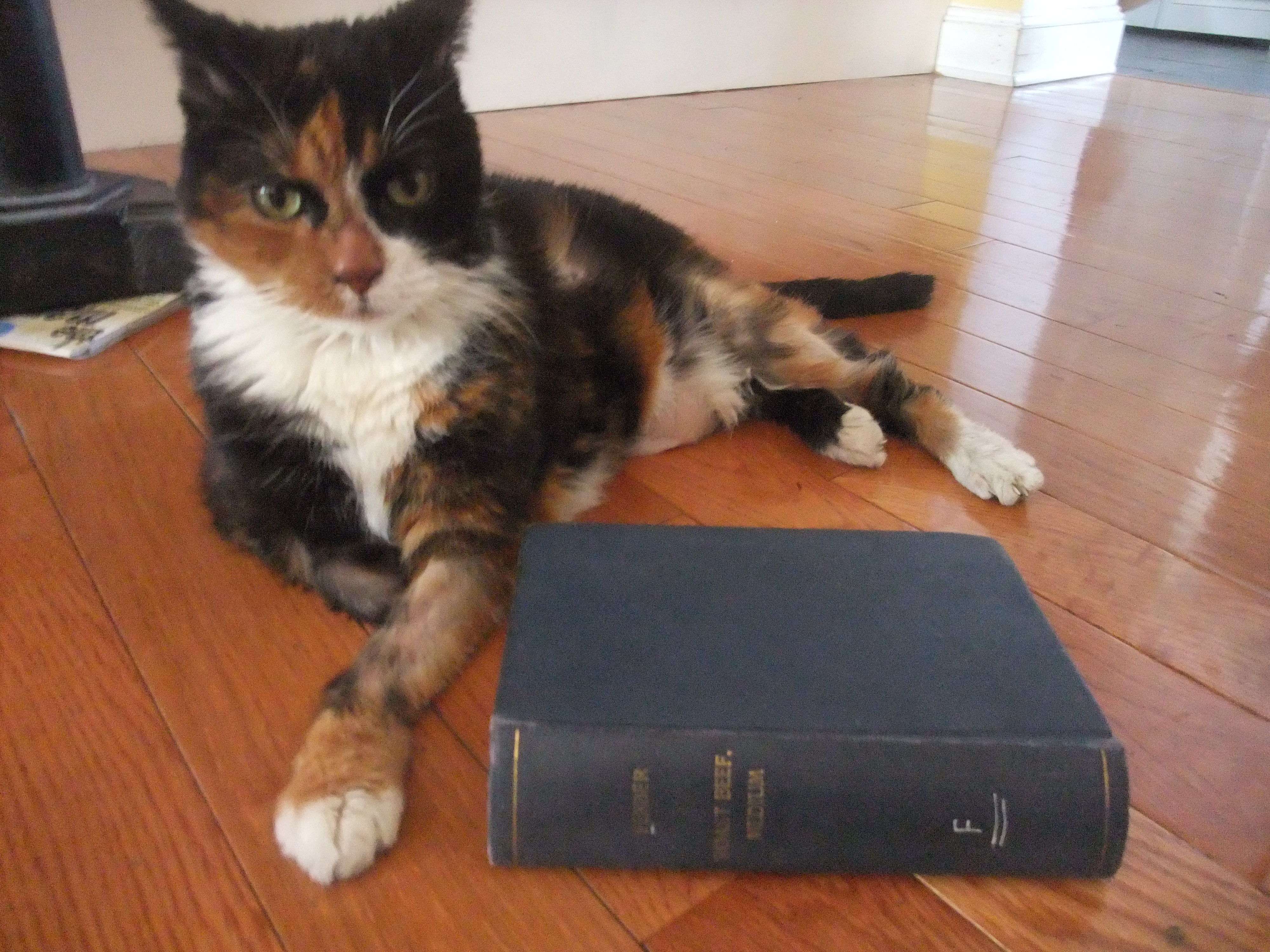
Roast Beef Medium by Edna Thurber
This novel is about a middle-aged, divorced traveling saleswoman named Emma McChesney and the prejudice and hardship she faces. She earns “a man’s salary” and supports her teenaged son. The book was absolutely fascinating as a document of sexism in 1913. Thurber wanted to get into controversial topics but had to talk around them, so sometimes I was baffled as to what was going on, but eventually everything would become clear. (I think.) For example, there was one part where I thought the main character Emma was befriending a drag queen but it turned out instead the woman was a stripper. (This makes me sound really thick, but all the talk about “I’m not a real woman” and working in a special club for men only was confusing. And there’s a lot of mystifying period slang.)
I cannot tell if Edna Thurber really believed that housewifery and marriage were the only things that could fulfill a woman, or if she felt (perhaps rightly) that it was obligatory to throw that kind of sentiment over a book that’s about a strong single woman with a career. Reading this book was actually a bit painful because of the unending sexual harrassment Emma faced. It was of a very sanitized “let me take you out to dinner because you’re so beautiful” kind, but I still found it upsetting. Weirdly, this book reminded me of the Lad: A Dog series by Albert Payson Terhune because they both have the same thing happening over and over: Lad/Emma meets someone who is prejudiced against him/her, but then Lad/Emma proves him/herself through incredible heroism and nobleness, and the person realizes how wonderful s/he is. Couldn’t Emma just once meet someone who didn’t make all kinds of assumptions about her, and why did she have to educate these sleazebags over and over? It was just depressing, but I think hyper-realistic.
Here’s a description of Emma and her best friend. “Theirs was not a talking friendship. It was a thing of depth and understanding, like the friendship between two men.” Hate yourself much? But then, “They sat looking into each other’s eyes, and down beyond, where the soul holds forth. And because what each saw there was beautiful and sightly they were seized with shyness such as two men feel when they love each other, so they awkwardly endeavored to cover up their shyness with words.” Oh, I see, so it’s like that kind of friendship between men.
I looked at Edna Ferber’s Wikipedia page and it seems a lot of people think she was gay, but there’s no evidence she ever had a romantic or sexual relationship with anyone, so a lot of other people think there’s no basis for that assumption. I am equally compelled by both points of view, especially based on the passage above. On the one hand, it seems obvious that a woman who never had any attachment with a man was a lesbian and just kept it on the DL; practically everyone I know is gay so why not Edna Ferber? On the other hand, maybe she was ace and just wanted to gaze into someone’s eyes, but people can’t conceive of that as possible so they are unfairly stuffing her into the gay category. Either way, Edna Ferber was not your average bear, and this book reads as very “coded” but I can’t quite crack the code.
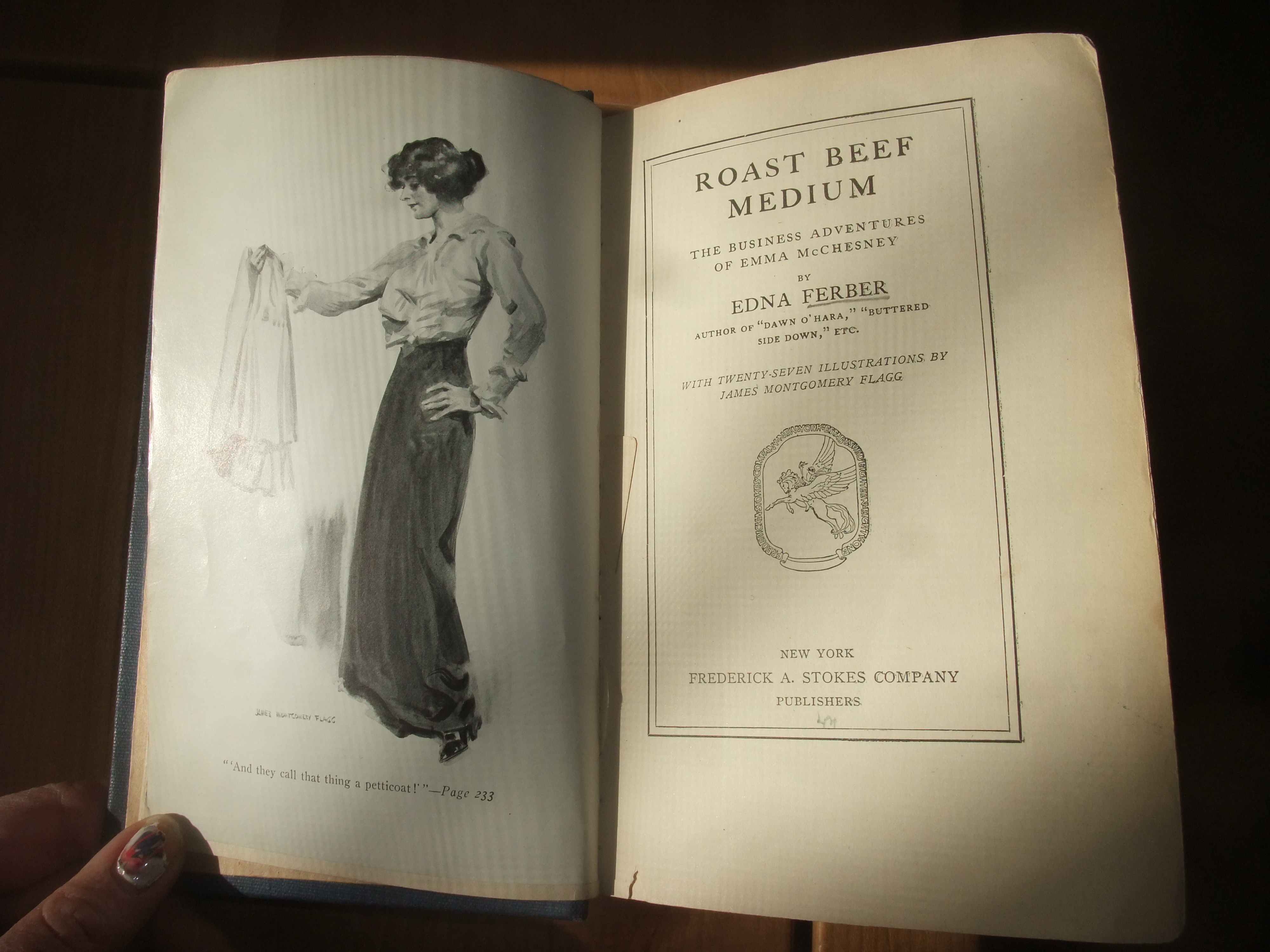




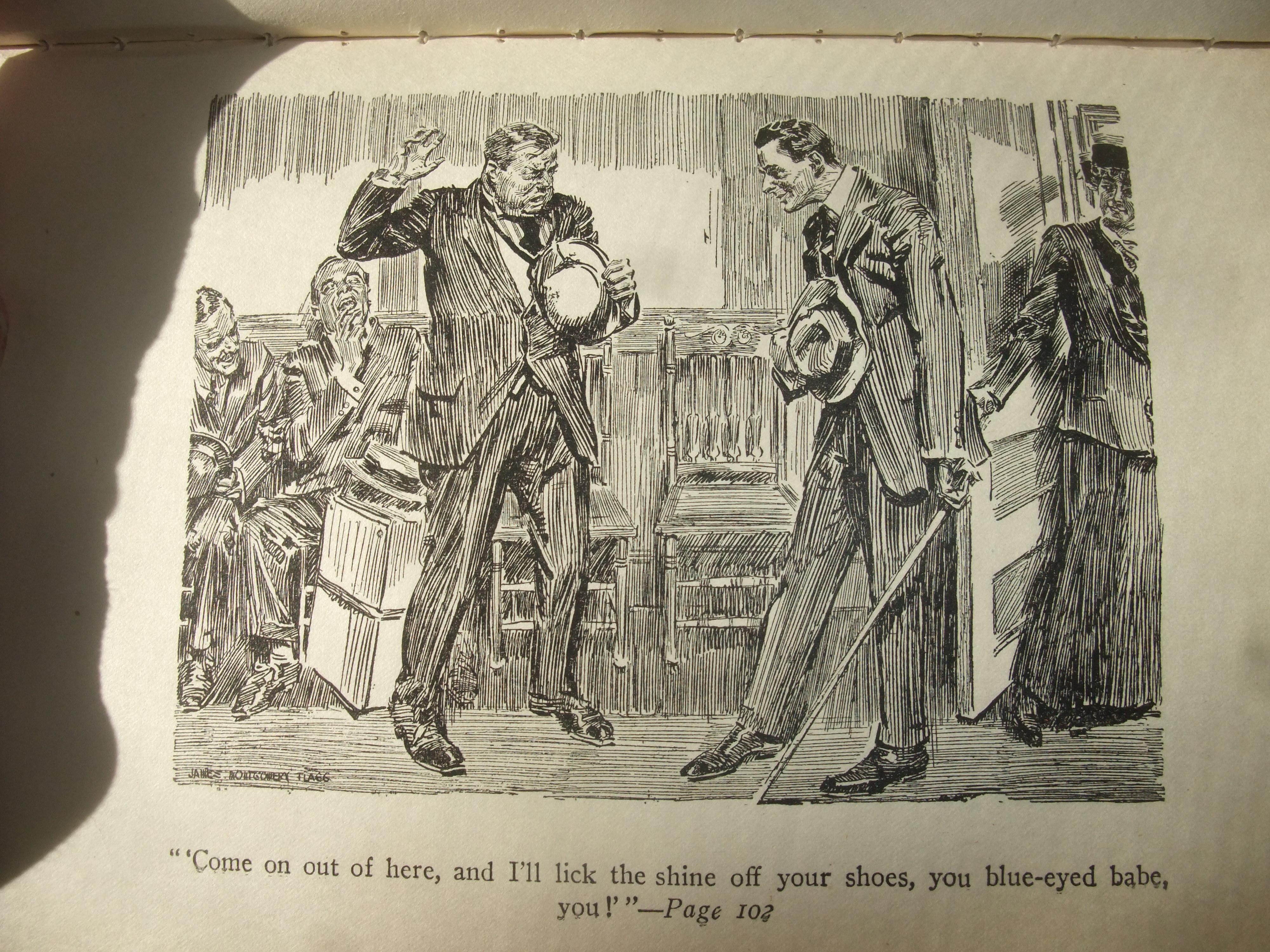

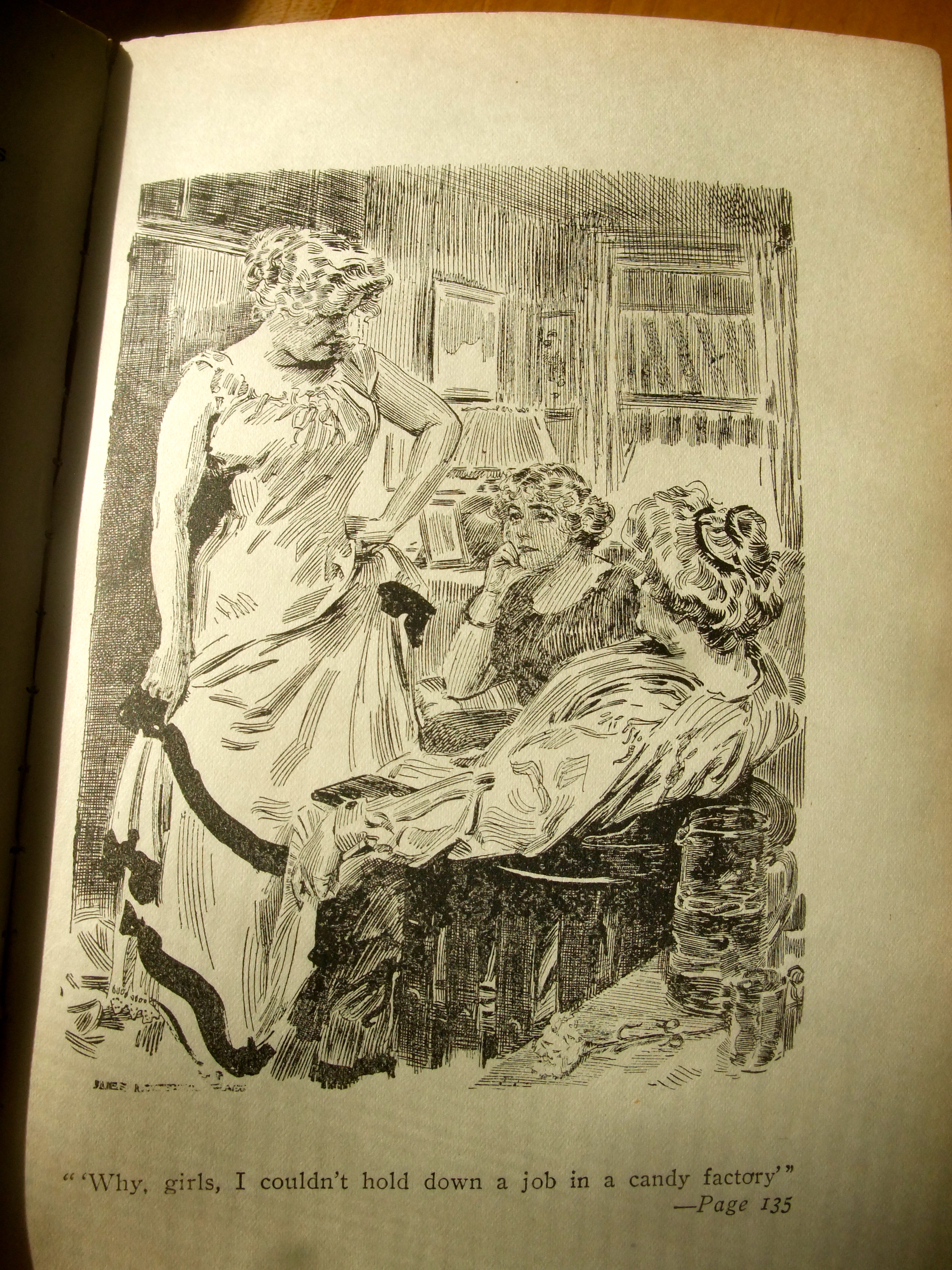
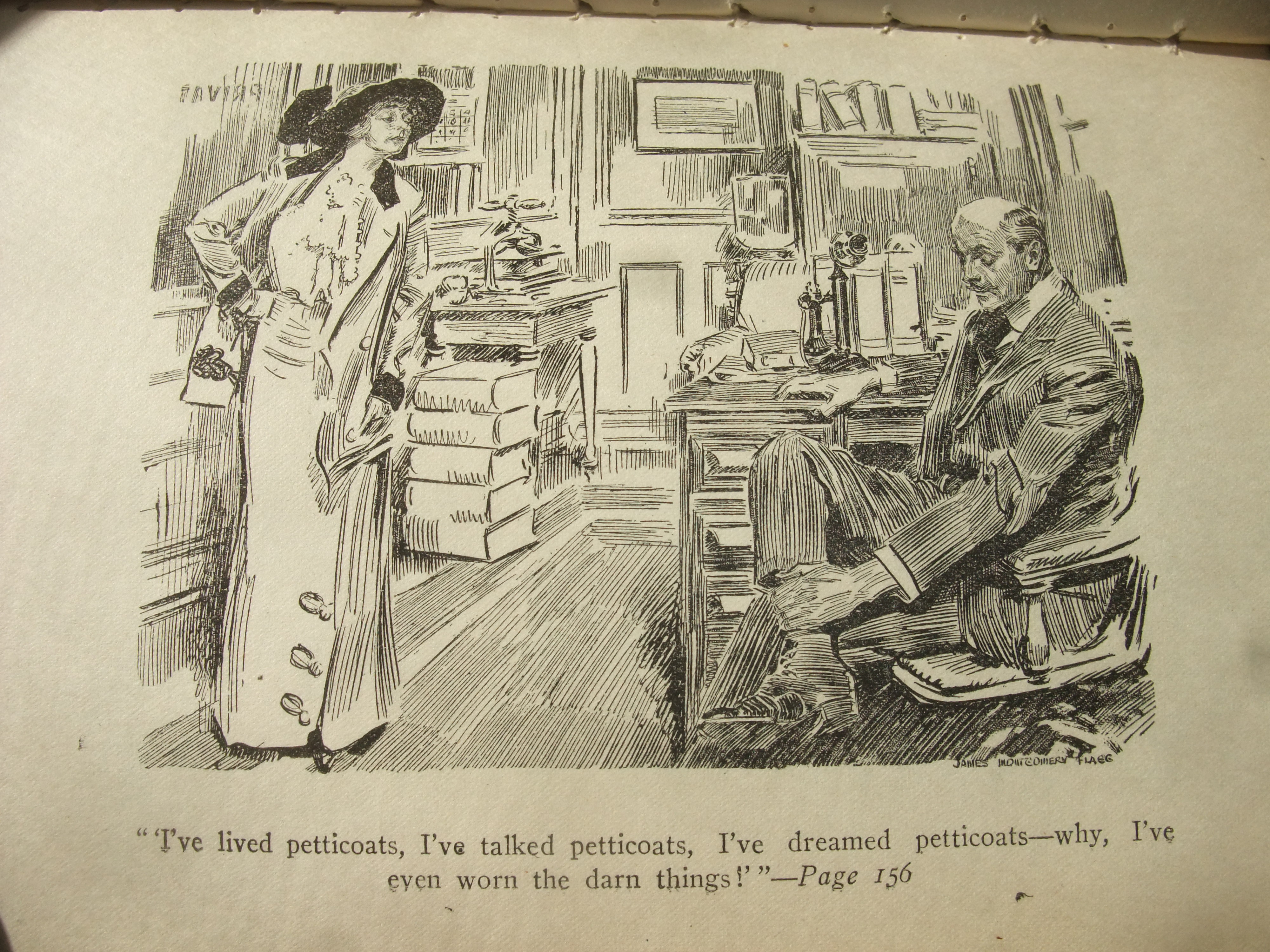









O Pioneers! by Willa Cather
I read this in college and remember almost nothing about it, other than it was about immigrant agricultural workers and it was kind of a downer. I remember liking it. Thank Heavens I went to college, huh? I learned so much! There’s also controversy about whether Willa Cather was a lesbian but I think this time it’s an open-and-shut case.
Laddie by Gene Stratton-Porter
Narrated by the youngest child, this novel depicts growing up in a large family in the country as alternately idyllic and horrifying (although clearly Stratton-Porter thought it was all awesome.) The good: playing unsupervised outdoors all day, having adventures and learning all about flora and fauna. The bad: playing unsupervised outdoors all day, so one older brother tries to hang her to see what it’s like, she tries to kill a ram, she and the same brother feed a goose until it splits open and dies. This dichotemy seems incredibly realistic to me and reminded me of my girlfriend’s account of her childhood in County Clare. The teacher hits the main character across the face on her first day and her brother tells her it was her own fault and to keep quiet about it; again, this seemed like searing realism. At first the main character feels unwanted and unloved because her mother didn’t want to have another child, but her brother Laddie of the title is her champion and truly cares about her, and by the end of the book so does the rest of the family. There’s a romance between Laddie and a neighbor girl, and a lot of religious content that was completely mystifying to me. I thought it was forward-thinking for the mom to say that women should have their own money.
The Valley of The Moon by Jack London
I haven’t read that much Jack London and I thought he only wrote nature stories about wolves and people dying in the snow. So this novel took me by surprise, especially the social commentary on working class life. The story is about a factory girl named Saxon who falls in love with a teamster/former prizefighter named Billy. Life is hard, the teamsters’ strikes keep getting busted, the cops are shooting strikers, and all the stress is driving Billy to drink and be brutal to Saxon. But just when it’s all looking bleak, they decide to drop out of city life (I think they’re in Oakland) and go on the road in search of their dreams and a peaceful place to live sustainably, and everything changes for them. It kind of reminded me of Steinbeck, with a bit more muscular prose style. It was really interesting to read about these rural farm places in California that I know are today very populated. The downfall: anti-immigrant sentiment and racial slurs.

The Golden Road by L.M. Montgomery
I read the previous book in this two-book series (The Story Girl) two years ago for the books of 1911, but I had forgotten the characters and never really caught up to speed. It’s about a group of children who are friends, one of whom is the narrator. The narration was weirdly Jamesian (complicated, obfuscating) and actually kind of made me think of books with a group narrator like The Virgin Suicides—not what you expect for a children’s book. It didn’t help that two of the children are named Sara—I know there were fewer names a century ago, but still. My favorite parts were a case of mistaken identity in which the children thought a visitor was deaf but she wasn’t; when they were forced to stay overnight with a witch; and when their cat went missing. The children wrote a newspaper about their doings, which was a tiny bit boring. I felt there was an over-reliance on the children accidentally using the wrong product with disastrous results, in baking and so forth. This device was so effective in Anne of Green Gables when Anne dyed her hair green and got her best friend drunk but has now gotten a bit over-done. I think L.M. Montgomery was a bit bored by the book too, because at the end almost all the characters had moved away or were soon to die of consumption, so there’s no possibility of a sequel except in fan fiction. The nicest thing about this novel was its depiction of the last days of childhood and how precious it is when you can actually see it about to slip away from you. Overall I would recommend the Anne or Emily books before this one.
Totem und Taboo by Sigmund Freud
DNF. When I saw that the subtitle was “Some Points of Agreement between the Mental Lives of Savages and Neurotics,” I had a pretty good sense that this book was going to be awful. But I wanted to give it a fair shot. On page one of Chapter One (“The Horrors of Incest”), I read, “I shall select as the basis of comparison the tribes which have been described by anthropologists as the most backward and miserable of savages, the aborigines of Australia.” At that point I just gave it up as a lost cause. I flipped through the rest and basically his point is that psychologically people in traditional societies are just like children. I think in general the non-fiction of a century ago is not going to stand up as well as the fiction. I do grant this book the third most porn-y name, which seems only right.

What did I miss from 1913?
I had to bring these books back to the library, overdue and unread.
Pollyanna by Eleanor H. Porter
The Return of Tarzan by Edgar Rice Burroughs

I really do plan to read these and there’s nothing to stop me, because I bought them. When I do, I’ll write reviews.
The Conquest by Oscar Micheaux
The Third Miss Symons by F.M Mayor
The Regent by Arnold Bennett
Hagar by Mary Johnston
Children of the Age by Knut Hamsun
The Sequence by Elinor Glyn
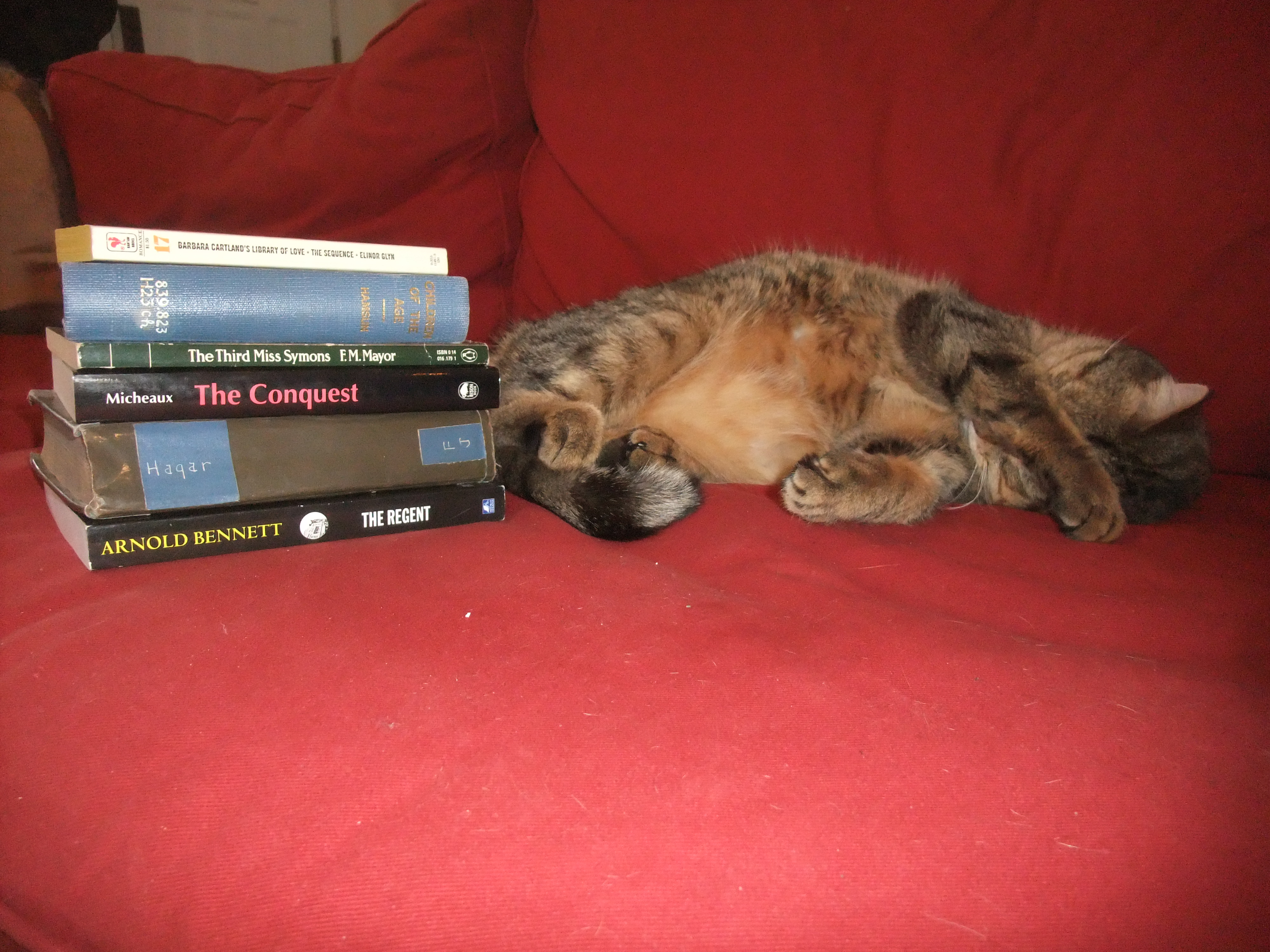

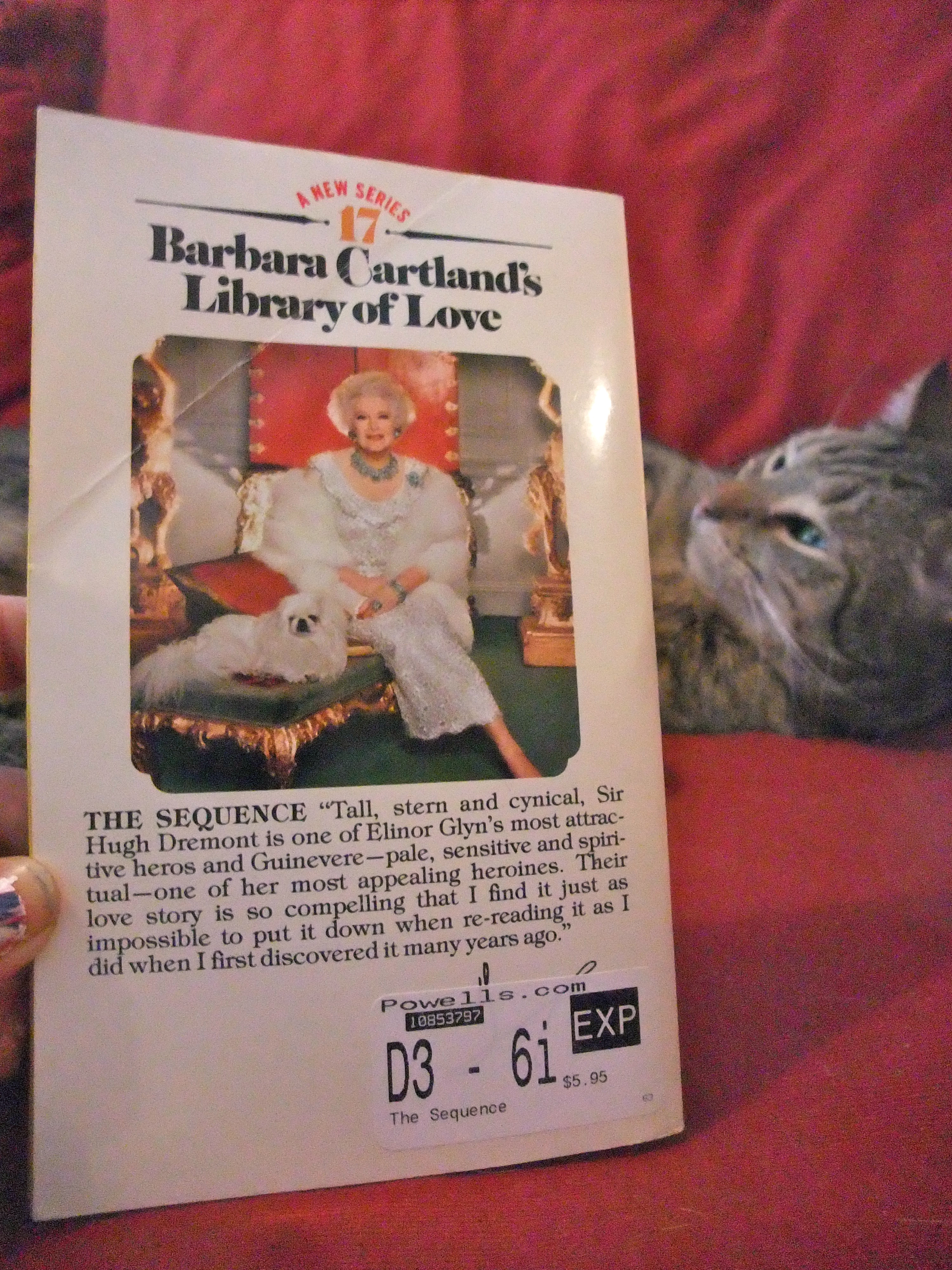
I just inherited Swann's Way by Marcel Proust from my mom but this is not the right time in my life for me this book. This copy was given to my mom in 1953 by her friend Ilse. They must have been high school seniors at the time. My mom told me she and Ilse sent postcards back and forth keeping each other updated on their progress through the book.

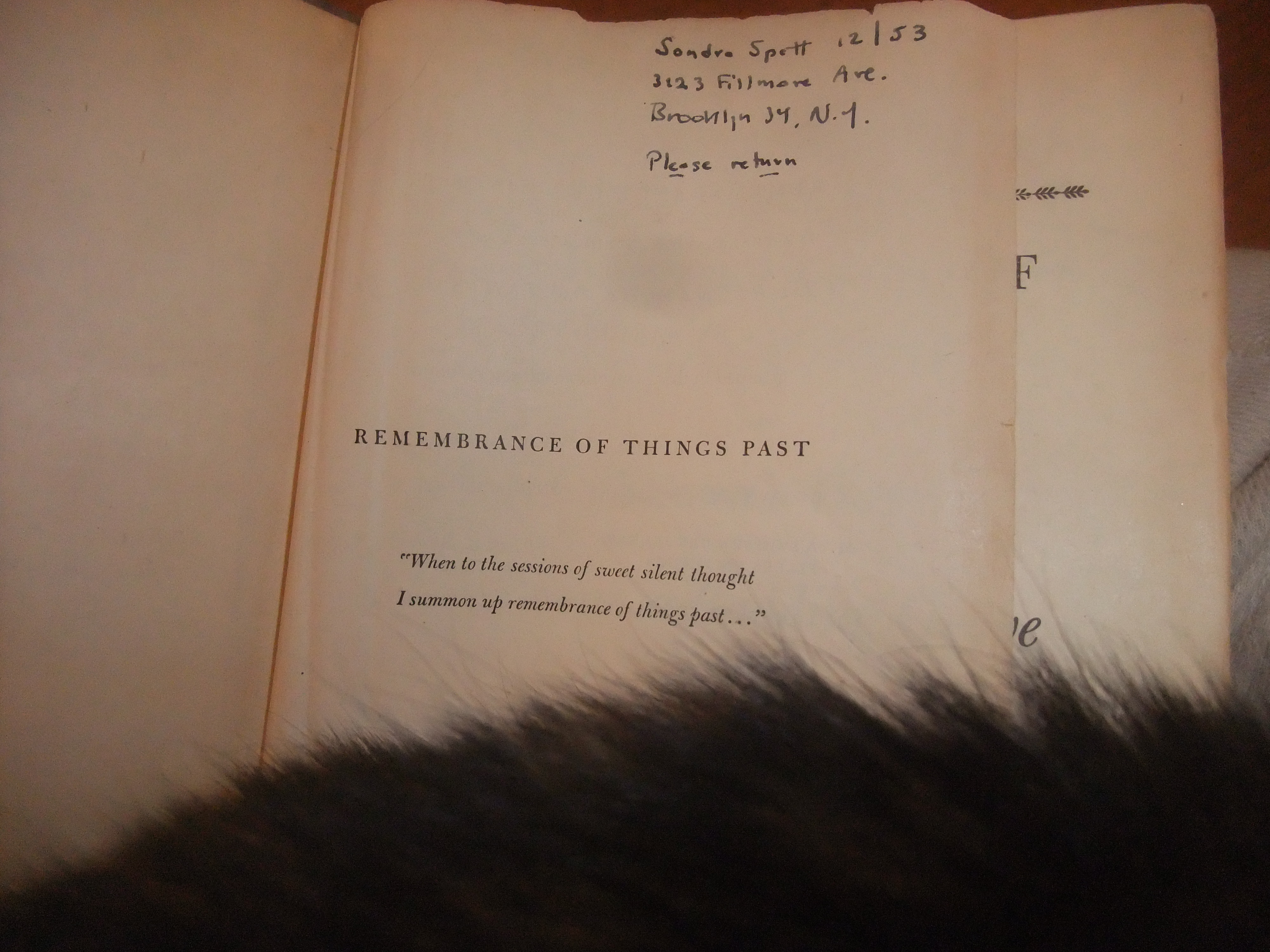

To learn about more books of 1913, visit the Wikipedia page.
Best of 1813
Pride and Prejudice by Jane Austen
Well, I’m not sure if I’ve read any of the other novels of 1813, but I am confident that this is the most enduring novel of 1913 and the one with the most movie adaptations and spoof versions.
Best of 2113
The Martianess of Islington by Fortescue Imamu-Cottingforth
Literary trends are cyclical, and the books of 2113 have so much in common with the books of 1913. The novel takes place in 2100, just a few years after the advent of eternal life and free energy on planet Earth. Emblior, a Martian immigrant aged three hundred, lives alone, humbly and happily, in a tiny compartment in London. Everyone relies on her but she is first in no one’s heart. According to the literary conventions of the day, the love interest is not introduced until chapter thirty, when
the pleasure balloon Bowbelle explodes, causing the first deaths since the Singularity, and Emblior is thrown into companionship with the brooding and complex Lord Zabblebrox. Love blossoms, but the disembodied head of Lord Zabblebrox’s first wife looks on disapprovingly from her Hover Jar, causing trouble between the young lovers. The novel is narrated by the twelve heads of Pastor X-12, who is relating to his cousin what he witnessed through a keyhole.
 1
1
 best of 1813
best of 1913
best of 2113
booth tarkington
british
croatia
e. nesbit
edith wharton
edna ferber
freud
gene stratton porter
innocence
jack london
laddie
lm montgomery
my mom
o pioneers!
oscar micheaux
proust
recherche du temps perdu
roast beef medium
saki
the brave adventures of laptich
the conquest
the custom of the country
the flirt
the golden road
the n word :(
the valley of the moon
totem und taboo
wet magic
when william came
willa cather
best of 1813
best of 1913
best of 2113
booth tarkington
british
croatia
e. nesbit
edith wharton
edna ferber
freud
gene stratton porter
innocence
jack london
laddie
lm montgomery
my mom
o pioneers!
oscar micheaux
proust
recherche du temps perdu
roast beef medium
saki
the brave adventures of laptich
the conquest
the custom of the country
the flirt
the golden road
the n word :(
the valley of the moon
totem und taboo
wet magic
when william came
willa cather
Best of 2013 and 1913, Part Five: 1913, the Second Installment
The Weaker Vessel by EF Benson
All the books I’ve read by E.F. Benson have been droll/slightly campy comedies, so I felt right at home as the book opens with the spirited daughter of a clergyman whose comical, ultra-religious stepmother won’t let her read salacious literature, play jolly tunes on the organ, or have any other kind of fun. Then I was quite surprised when the book turned out to be a moral tale about the perils of alcoholism and adultery.
It appears that men are the weaker vessel of the title. While the description of the alcoholic husband seemed extremely true to life, it was somewhat painful to read the glorification of wifely codependency. I didn’t get the impression that Benson understood anything about relationships between men and women, he was just spitting out cliches, but the story was interesting and readable the whole way through. I especially liked his shiny portrayal of acting and the theater. At the end there was a very easy way out that would have punished the guilty and allowed the blameless characters to couple off, but he didn’t take that. Instead he presented a very forward-thinking view of disability that even today is rarely embraced in literature, so I thought that was neat.
One of the things I like about reading the novels of 100 years ago is that it’s harder to guess what’s going to happen, because we’re not steeped in the tropes of that day. There was a sticky elevator mentioned several times, and I was positive that someone was going to get trapped in it a la “The Way Up To Heaven” by Roald Dahl. But no, that was all in my mind; I guess people just talked about their elevators a lot back if they had them.
Eldorado by Baroness Orczy
A delightful book in the Scarlet Pimpernel series. It opens in France, during the height of the The Terror, at the Opera, where all the surviving aristocrats have come, just like they always do, dressed in their finest. But they’re all trembling in their funny French shoes because no one knows who among them will be denounced and beheaded in the morning. If you wrote a YA novel set in a dystopia like that, you’d be accused of overdoing it, but it really happened! The Scarlet Pimpernel has a plan to rescue the Dauphin, who is imprisoned in the Temple. This really piqued my curiosity because we know that in real life the Dauphin died there and was not rescued, so was Baroness Orczy going to allow her hero to fail?
Eldorado is not as good as the first in the series, The Scarlet Pimpernel, but nothing could be since a) the most exciting part is finding out the Scarlet Pimpernel’s secret identity and b) I read The Scarelet Pimpernel at age eleven, which is surely the Golden Age (in the Peter Graham sense) for these books. However, Eldorado notably lacks anti-Semitism, which is nice. I do not know why the novel is called Eldorado, as it is set in England and France and there’s no gold. By the way, I always thought “Baroness Orczy” was a pen name and she was no more a baroness than I am Count Chocula, but I finally looked her up on Wikipedia and she actually was one!
The Coryston Family by Mrs. Humphry Ward
My brother said that when he was in graduate school studying English, Mrs. Humphry Ward was dismissed as a nobody; they didn’t read any of her books; and she wasn’t sufficiently rehabilitated to be given a first name. (Turns out she was Mary Augusta Ward.) But I liked this book and I’m looking forward to her 1914 offering. My brother was also told she was a Victorian so he could not believe she had a book in 1913. However, all English writers did not conveniently die at the same moment as Queen Victoria, so there was some overlap, and in fact two thirds of Mrs. Humphry Ward’s books were written in the Edwardian period. She did seem to have a kind of Victorian viewpoint, though. There was a strange timeless quality to this novel, and it’s hard to know when it was set. The House of Commons was debating a Land Bill and the aristocrats were very concerned about their “rights” and estates being taken from them, making it feel like 1830. But the main character was a Suffragist, which was accepted as a common viewpoint (although derided as wrong), making it seem more contemporary to 1913. The characters drove about in strange conveyances but I think I remember some cars. I guess it was probably set in 1913 but the ways of the English aristocracy are so peculiar and unchanging that everything was the same as in Victorian times.
The characters had political opinions ranging from Conservative to radical Socialist. I couldn’t figure out which platform the author agreed with, except that she seemed to think women should not vote but instead use their exquisite goodness to make the world a better place without meddling in politics. I wrote a review on Goodreads where I actually explained the plot.
Coming Soon: the final installment of 1913, Best of 1813, and Best of 2113.
Best of 2013 and 1913, Part Four: 1913, the first installment

Moscow firemen in 1913 (according to teh interwebz)
Ah, it's 1913. There'll never be another war. Although if you live in Mexico, Pancho Villa is leading a revolution. If you are Emily Davison, British suffragette, you make a slight miscalculation and are trampled to death by a race horse as you attempts to drop a banner on it. If you're a Norwegian woman, though, you may now vote. If you are the House of Lords, you reject an Irish Home Rule bill, and then on "Bloody Sunday" police injure 400 people in Dublin. If you live in New York, you get a new, uglier Grand Central Terminal and also the Woolworth Building, the tallest building in the world! If you live in Dayton, Ohio, a flood destroys your home. You lucky American, you may also smoke your first packaged cigarette (a Camel.) If you are a balletomane in Paris, you riot when you see Diaghilev's Rite of Spring, set to Stravinsky. If you are tired of the Ottoman empire, you attend an Arab conference with other Arab nationalists. If you are Black in South Africa, you are officially outlawed from owning land. If you live in Copenhagen, you enjoy a beautiful new statue of The Little Mermaid. If you are a miner in Wales, you may be killed in an explosion; if you are an Indian miner in South Africa, Mohandas Gandhi leads you on a march. If you are Greece, you annex Crete, which had just barely shaken off Turkey. If you are Woodrow Wilson, you sign the Federal Reserve into existence. If you are Yuan Shikai, you are the first elected president of the Republic of China.
But what will you read to while away the hours?
Virginia by Ellen Glasgow
A forgotten masterpiece about a woman named Virginia from Virginia who has an "ordinary" life with marriage and children. The downfall of this marvelous book: racism. My long review here.

It's on the table, next to my cat.
Le Grand Meaulnes by Alain-Fournier (also called The Wanderer)
I read this book in 1998 and I remember how beautiful and haunting it was and what a special experience it was to read it, but I remember almost nothing about the plot. There was a little boy. . . another boy. . . a school. . . a house. . . a party. . . . a girl. . . a journey. That might not even be right. It wasn't about the plot. I think it was about innocence.
I just inherited my mother's two copies, one in English and one in French. I remember we talked about it when I read it and she told me how much she loved this novel. You can tell she loved it, because she didn't read French but she had a French copy.

From L to R: my original copy, my mom's copy, my mom's copy in French.

Her bookplate.
Sons & Lovers by DH Lawrence
I read this in the mid-1990's, so once again I don't remember it well. It's about a sensitive, artistic boy who doesn't fit into his working class family (his father is a miner?) but he's very close to his mother. As I recall, there is some sex and it seemed very emotionally authentic.
The Tale of Pigling Bland by Beatrix Potter
I did read this as a child, but what I chiefly remember is that we had a record of Claire Bloom reading it out loud. She really gave a killer performance, bringing all the depth and meaning to the surface. The parts I remember best: "Beware of bacon, cream, and eggs. Always walk on your hind legs!" and the ending (sorry for spoiler) "Over the hills and far away, she danced with Pigling Bland." I think it's about a pig who goes on an errand, gets into trouble, meets another pig, and they escape.
The Patchwork Girl of Oz by L. Frank Baum
One of three books the prolific Baum published in 1913. I remember this as one of the best of the Oz books. The Patchwork Girl is a stuffed doll brought to life for the convenience of humans, similar to the Scarecrow. My brother pointed out what a terrible conundrum it is that Ojo the Unlucky must break the most important rule of Oz (do not harm any living creatures) in order to save his uncle's life.
The Little Nugget by PG Wodehouse
Every book I have read by PG Wodehouse has been charming and diverting, and this was no exception. Until now I have mostly read Jeeves books so I was surprised at the differences in this one—specifically, that there was gunplay, a proper romance, and the main character was of near-average intelligence. There were two butlers though—but there’s something suspicious about one of them! My favorite character was Smooth Sam Fisher. The book design was lovely--the publisher was Overlook. Unfortunately there is one use of the “n word” which I think a good editor should take out in the next edition. Oh, I should say, the novel is about a kidnapping, or a series of attempted kidnappings. Agatha Christie said this was her favorite Wodehouse novel. But Wodehouse was very offended by this because he had written dozens more since then, so he thought that meant she hadn't read any of his later work. I bet she did, but she just liked this the best.

Up Next: More of the Best of 1913!
 agatha christie
alain-fournier
artistic
beatrix potter
best of 1913
big secret
british
claire bloom
dh lawrence
ellen glasgow
gunplay
innocence
kidnapping
l. frank baum
le grand meaulnes
little nugget
love will tear us apart
miner
my cat
my mom
ojo the unlucky
oz
patchwork girl
pg wodehouse
pigling bland
prolific
racism
sensitive
smooth sam fisher
sons & lovers
the n word :(
virginia
what is love
agatha christie
alain-fournier
artistic
beatrix potter
best of 1913
big secret
british
claire bloom
dh lawrence
ellen glasgow
gunplay
innocence
kidnapping
l. frank baum
le grand meaulnes
little nugget
love will tear us apart
miner
my cat
my mom
ojo the unlucky
oz
patchwork girl
pg wodehouse
pigling bland
prolific
racism
sensitive
smooth sam fisher
sons & lovers
the n word :(
virginia
what is love
Best of 2013 and 1913, Part Three: 2013 Non-Fiction/Memoir
Top Seven:
Autobiography by Morrissey
This book gets the #1 spot even though actually I haven’t finished it yet. I figure you can only read a book for the first time once and I want to savor it. My girlfriend keeps all three copies we own locked in a trunk so that I won’t tear through it.

It is so rare that I can include human interest in this list! My girlfriend reads one copy while the other lies in readiness.
Turn Around Bright Eyes by Rob Sheffield
I wrote a long review here. This is a memoir about karaoke and true love.
Ziggyology: A Brief History of Ziggy Stardust by Simon Goddard
The author has some odd ideas, and the first 90 pages are about kabuki theater and the origin of the universe, but this is a really cool book. The conceit is that David Bowie’s Ziggy Stardust persona was like a real person taking over Bowie’s life. There are a lot of crazy coincidences that will blow your mind. My favorite parts were 1) when Bowie finally saw the Velvet Underground live and then met Lou Reed but it turned out it wasn’t really Lou Reed at all 2) everything about Marc Bolan; he is presented as David Bowie’s doppelganger who is trying to sabotage him. Also there are some very nice photos, and the book design is gorgeous.

The cover


Wired Up: Glam, Proto Punk & Bubblegum European Picture Sleeves 1970-1976. ed by Mary Blount and Jeremy Thompson
A collection of insanely cool &/or indescribably weird ‘70s album covers, beautifully laid out art-book style. The pages open flat. There are some interesting short essays and interviews too. A few well-known bands are included, but the criteria is just distinctive European album cover art from a time when people would buy records based on what the sleeve looked like. My girlfriend gave me this book for Chuannukah which was great because it was something I really wanted but never would have gotten for myself.
So my girlfriend has learned how to have lucid dreams, and the next frontier is for me to mentally send her a picture while she is sleeping, which we both know is impossible but it’s fun to try. I used an image from this book for one of the pictures. This practice is very restful for me because when I wake up in the middle of the night instead of worrying about one thing and another, I can just think, “Red background, two glam Asian girls with long hair in kimono-style minidresses and silver knee high go go boots, Ride Captain Ride.” Then sometimes I fall right back to sleep.

Bowie: Album by Album by Paolo Hewitt
I debated with myself over whether or not to include this because I haven’t really read it yet, just looked at the pictures, so I wasn’t sure if it counted as a book I’ve read. Last year I didn’t include David Bowie Styles in my Best of 2012 because I only looked at the pictures. But I decided that I did read this in a coffee-table-book kind of way, even though this is more than a coffee table book. It’s just lovely.

Calling Dr. Laura by Nicole Georges
Fun, touching, lesbian, Portlandish graphic novel about a young woman finding out that her father is alive even though her mother said he was dead.
The Lost Daughter by Mary Williams
A memoir about growing up poor in a chaotic, neglectful family while her Black Panther father was imprisoned. One bright spot was going to a posh summer camp run by Jane Fonda. Mary confided in Jane Fonda about how she had been sexually assaulted, and Jane Fonda adopted her (in every sense except legally.) Mary had many adventures including working in Antarctica and running a non-profit for Sudanese “lost boys,” and then finally reconnected with her biological family. I felt there was something missing, a sense of the writer being able to sum up her whole life so far and say what it was all about, but I didn’t really care because it was interesting.

What Else?
Walden on Wheels: On the Open Road From Debt to Freedom by Ken Ilgunas
Kid pays off his college debt in three years by working in grim conditions in Alaska, then decides he can get through grad school with no debt if he lives in his van, and learns what freedom and autonomy really are.
After Visiting Friends by Michael Hainey
There was always some mystery surrounding Hainey’s father’s death, so Hainey finally decided to use his journalistic skills to uncover the truth.
American Savage: Insights, Slights, and Fights on Faith, Sex, Love, and Politics by Dan Savage
You don’t have to agree with Dan Savage on everything to like this book. The parts that I remember best are when he has the head of the National Organization for Marriage over to his house for dinner so he can debate him, and the heartbreaking part when his mom dies.
Next Up: my favorite part! Best of 1913, and bonus 1813 and 2113!
 album covers
antarctica
autobiography
best of 2013
bipan
big secret
black panther
book design
british
calling dr. laura
channukah
david bowie
debt
gay
glam
jane fonda
kabuki theater
karaoke
last of the famous international. . .
lesbian
lou reed
love will tear us apart
lucid dreams
marc bolan
mary williams
memoir
morrissey
my cat
nicole georges
non-fiction
origin of universe
rob sheffield
simon goddard
sudan
the lost daughter
the smiths
turn around bright eyes
velvet underground
what is love
wired up
ziggy stardust
ziggyology
album covers
antarctica
autobiography
best of 2013
bipan
big secret
black panther
book design
british
calling dr. laura
channukah
david bowie
debt
gay
glam
jane fonda
kabuki theater
karaoke
last of the famous international. . .
lesbian
lou reed
love will tear us apart
lucid dreams
marc bolan
mary williams
memoir
morrissey
my cat
nicole georges
non-fiction
origin of universe
rob sheffield
simon goddard
sudan
the lost daughter
the smiths
turn around bright eyes
velvet underground
what is love
wired up
ziggy stardust
ziggyology
Best of 2013 and 1913, Part Two: 2013 YA

Have I mentioned how handsome my cat is?
Top Ten:
Homeland by Cory Doctorow
Sequel to Little Brother. Whistleblowing, kidnapping by government agents, peaceful protests aided by technology, nerdy activism, the “War on Terror,” and Burning Man. This book is perfect. Very brief review here.
Rapture Practice by Aaron Hartzler
You don’t see a lot of YA memoir. This one is really terrific. About a boy growing up in a strict fundamentalist Christian family. Turns out, he’s gay. That sounds a bit ho-hum, but Hartzler tells his story in a really nuanced, compassionate, and funny way.
Proxy by Alex London
In my review, I said, “Think M.T. Anderson's Feed meets Lloyd Alexander's The Black Cauldron, with some queer content thrown in.” In a world just like ours (only more so), a few are super-rich and everyone else is in debt they can never pay off. When the rich break the rules, their proxies are punished for them. What happens when a Patron and Proxy meet? I realize that this summary makes it seem kind of porn-y, but it’s not.
This Song Will Save Your Life by Leila Sales (Author’s original title: “Last of the Famous International Party Girls,” then “My Suicide Playlist.”)
Elise has been bullied at school forever and is getting quietly desperate. Then she stumbles upon a secret nighttime warehouse dance party and meets dreamy Char (short for “DJ This Charming Man”), who teaches her to be a DJ. Elise’s life is completely transformed by music and meeting people who. . . it’s not that they don’t care about being cool, they just have a wildly different sense of what being cool means.
Eleanor & Park by Rainbow Rowell
I kept reading reviews of this book, and the synopsis always made me say, “Feh.” But after encountering so many rave reviews, I decided to try it, and I loved it. Let’s see if this synopsis makes you say “Feh.”
It’s 1986, in Omaha, and the story is told in alternating viewpoints. Eleanor’s life is awful because her abusive stepfather won’t allow her to have things like toiletries and new clothes. Because of the above and the fact that she’s fat and has a kooky sense of style, everyone at school thinks she’s a freak. Park, who sits next to her on the bus, thinks so too, but over time he lets her read his comics over his shoulder. Then he notices she has Smiths song titles written on her notebook, but it turns out that she’s never actually heard the Smiths because of course she has no cassettes. This is the most depressing thing Park has ever heard, so he makes her a tape. True love blossoms.
This book kind of has everything because it’s nerdy, it’s sexy, it’s sad and it’s uplifting. Also mostly it seems like stark realism but there’s one pivotal thing that the abusive stepfather does that in the context of the novel is creepy, but when you compare it to real life, it’s like, wow, if only real abusive adults would leave it at that and not do the actual stuff they do. So it’s kind of a mix of realism and wish fulfillment. The writing is so strong that it actually made me question one of the core elements of my being: the fact that I hate the Joy Division song “Love Will Tear Us Apart.” Eleanor and Park describe this song so lovingly and make it sound so awesome that I thought, “Hmm, I must be wrong.” But no, I still don’t like it.
Also, there’s a the lack of diversity in YA and it’s very rare to have an Asian/biracial protagonist (Park is Korean and white) especially in a love story, so that was cool.
Darius & Twig by Walter Dean Myers
Two friends, a writer and a runner, have big ambitions, but it’s hard to get by in Harlem where they live. Walter Dean Myers is a national treasure—no, he’s a treasure for the whole planet.
More Than This by Patrick Ness
This is no ordinary book. The really cool cover that has a tiny door in it led me to hope that might be the case, and then my dreams came true. As the book opens, the main character Seth drowns. Then he wakes up, in what seems to be his childhood home in England, but the whole neighborhood is deserted. Or is it? You can’t take anything at face value in this book. If you look back at my review (in Best of 2013: Fiction) of The Arrivals by Melissa Marr that has a somewhat similar plot, you’ll see that I questioned whether whether true conceptual originality is even possible. Well, this novel shows that it is, perversely because it plays with the tropes that we’re all so accustomed to. Is any of the stuff that happens to Seth even really happening? If that sounds annoying, well, it is. When I finished the book, I felt frustrated, because even though the story was delivering the true nature of reality (as follows: you have no idea what’s real), I expect a book to have a certain novelistic sense of closure and explanation because it’s not real life, it’s a book. But then I kept on thinking about this book for a long time so I decided that it was a very profound reading experience where a little bit of frustration was okay. Similar to the experience I had with The Magic Mountain by Thomas Mann except that this book is quick and fun and easy to read and has a lot of action and also queer content.
Stealing Second: Sam’s Story by Barbara Clanton
Full disclosure: Barbara Clanton is a writer friend. I have read almost all of her books and enjoyed them all. This book is in a series about lesbian high school baseball players, and this is my new favorite in the series. Each book in the series is told from a different POV. This one is about Sam, a poor little rich girl who doesn’t have much of a relationship with her parents, but luckily she has a close friendship with her childhood nanny, who has stayed on as a sort of family retainer. Sam has a girlfriend Lisa who she’s very happy with but Sam doesn’t feel ready to come out yet. There is a big plot twist that took me by surprise. Brief review here.
Another 365 Days by KE Payne
Sequel to 365 Days. Basically a lesbian Diary of Adrian Mole. Fluffy and fun. I love the main character Clemmie’s daft ways and the fun British slang like “fit as the butcher’s dog.”
The Testing by Joelle Charbonneau
It’s not the plot that makes this book great. This is standard dystopian fare—teens living under evil regime must compete in a contest where only some will come out alive, &c. It’s just really tight and well-written and fun. A total page turner.
What else?
Fan Girl by Rainbow Rowell
A girl’s first year in college seems doomed because all she wants to do is write slash fanfiction and her identical twin sister wants to individuate herself from her, but then there’s a dreamy boy.
Unthinkable by Nancy Werlin
Companion novel/sequel to Impossible. A girl who has been trapped in a fairy realm is told she can leave, if she destroys her family.
The Reluctant Assassin by Eoin Colfer
Victorian orphan and child FBI agent must foil evil time travel plot.
Thorn Abbey by Nancy Ohlin
A retelling of Daphne DuMaurier’s Rebecca, set in a boarding school (just like in New Girl, one of the 2012 retellings.) Has a cool supernatural element and twisty ending.
The Culling by Steven Dos Santos
It’s that rarest of creatures, a gay dystopian YA novel! Teens living under evil regime must compete in a contest where only some will come out alive, plus queer content.
Shadows by Robin McKinley
Maggie lives in a world where magic is possible but forbidden. She doesn’t like her new stepfather because he has strange shadows that follow him around.
Two Boys Kissing by David Levithan
I admire this book because it is the first YA novel that has two boys kissing on the cover. I think it was clever of Levithan to base the book on the true story of two guys breaking the world record for longest kiss. I esteem Levithan for promoting diversity in YA even further by having one of his seven gay male teen main characters in the book be Korean-American and another be transgender. And in theory I appreciate the idea of having the book narrated by a Greek chorus of gay men who have died of AIDS. Everything about this book gave me the warm fuzzies, except for the reading it part. To be completely candid, I was incredibly bored every single second I was reading this book and I couldn’t wait for it to be over. It’s fair to say that I encountered this book at the absolute lowest point in my life (so far), and that may have something to do with my inability to jump on the love train for Two Boys Kissing.
In The After by Demitria Lunetta
Zombielike creatures have taken over the world but Amy has managed to survive for several years with a toddler in her fortress-like apartment. A chain of events leads her to a compound that’s safe from the creatures, but will this protected colony turn out to be a dystopia?
The Loop by Shandy Lawson
Ben and Maggie are forced to repeat the same two days that end in their deaths, over and over.
Moxie and the Art of Rule-Breaking by Erin Dionne
A girl gets involved in an art heist and treasure hunt in Boston. This book is actually Middle Grade (for pre-adolescents), not YA.
You Look Different in Real Life by Jennifer Castle
Along with four other kids, Justine is the subject of a series of documentaries (like the 7 Up series.) That was all very well and good when she was little, but now it’s ruining her life.
All Our Yesterdays by Cristin Terrill
A girl must travel back in time to kill someone. You won’t be surprised by anything that happens, but hey, time travel is always fun.
Tides by Betsy Cornwell
It’s about selkies! Also featuring eating disorders, transracial adoption, and queer content. Why do paranormal stories always involve a romance with a really creepy age gap?
The Shade of the Moon by Susan Beth Pfeffer
The final (?) book in this series about what happens when the moon is knocked out of orbit, unleashing cosmic destruction on the earth.
The Girl Who Was Supposed to Die by April Henry
Thriller about a girl who wakes up with amnesia and someone is trying to kill her.
Dance of Shadows by Yelena Black
Girl discovers sinister happenings at prestigious New York City ballet school. Full review here.
Next up: 2013 Non-fiction/Memoir
This is taking longer than I thought, so it might be a few days.
 aaron hartzler
abusive stepfather
alex london
another 365 days
barbara clanton
best of 2013
bold strokes books
book design
british
bullying
burning man
cory doctorow
daphne du maurier
darius & twig
debt
diary of adrian mole
eleanor and park
feed
fit as the butcher's dog
gay
harlem
homeland
ke payne
korean
last of the famous international. . .
leila sales
lloyd alexander
love will tear us apart
more than this
mt anderson
my cat
nancy werlin
patrick ness
proxy
rainbow rowell
rapture practice
robin mckinley
runner
sam's story
selkies
stealing second
stephen dos santos
the arrivals
the black cauldron
the culling
the magic mountain
the smiths
this charming man
this song will save your life
thomas mann
time travel
walter dean myers
war on terror
what is life
what is love
whistleblowers
aaron hartzler
abusive stepfather
alex london
another 365 days
barbara clanton
best of 2013
bold strokes books
book design
british
bullying
burning man
cory doctorow
daphne du maurier
darius & twig
debt
diary of adrian mole
eleanor and park
feed
fit as the butcher's dog
gay
harlem
homeland
ke payne
korean
last of the famous international. . .
leila sales
lloyd alexander
love will tear us apart
more than this
mt anderson
my cat
nancy werlin
patrick ness
proxy
rainbow rowell
rapture practice
robin mckinley
runner
sam's story
selkies
stealing second
stephen dos santos
the arrivals
the black cauldron
the culling
the magic mountain
the smiths
this charming man
this song will save your life
thomas mann
time travel
walter dean myers
war on terror
what is life
what is love
whistleblowers
Best of 2013 and 1913, Part One: 2013 Fiction
New features this year:
-a return to judging which are the “best” (why not? I’m no more unqualified than anyone else.)
-bonus features of Best of 1813 and Best of 2113.
-the author’s original title for their book, if I was able to discover it.
-I will disclose when my opinions are influenced by nepotism and intrigue, which is more than a real reviewer will do.
-as you can see, I'm using BookLikes now, and this will be a series of posts instead of one really long Facebook note.
Best of 2013: FICTION
Clearly I did not read very many novels for grown-ups that were published in 2013, but I did stumble across a few things that were extremely good.

The Top Two plus my handsome cat.
Top Five:
I Know Very Well How I Got My Name by Elliott DeLine
I could say that this was the best novel of 2013, but that would be a charming understatement. How about one of the best novels of any year? It’s about a kid growing up transgender, although there are many are other elements to the story. I wrote a full review here.
Love Minus Eighty by Will McIntosh (Author’s original title, and title of original short story in Asimov’s: “Bridesicle.”)
In a grim future, the dead can be cryogenically frozen and brought back to life—for a price, leading to an industry where dead women are revived for quick “dates” where they must convince their rich suitors to choose them for resurrection. This book made me think about questions like what is love and what is life and why we die and why we fear it, without ever swerving away from being a cracking good science fiction story. Also you don’t usually encounter well-written lesbian characters in science fiction by men, but here you do. And it had the coolest cover! There is a parchment wrapper that overlays the cover, acting sort of like a scrim on a stage—it's hard to explain, just look at these pictures.

That's with the paper overlay on.

That's with the overlay off.

That is the overlay itself. The whole thing is a book design triumph!
Nevada by Imogen Binnie
A young woman who’s transgender is living in NYC in the recent past and working at the the Strand, but then her life becomes completely unglued and she goes on a journey. Loved it. I wrote a full review here.
News From Heaven: The Bakerton Stories by Jennifer Haigh
Haigh’s awesome novel Baker Towers was set in a poor mining town, and she returns to the same setting and some of the same characters with these stories. I’ve mostly thrown in the towel on contemporary literary fiction, but Haigh is a subtle and wonderful writer. The story that stuck in my head the most was about a Bakerton girl who goes to work in New York City as a maid to a wealthy Jewish family. I liked having read Baker Towers first, but I think these would stand alone.
Artificial Gods by Thomm Quackenbush
Full disclosure: I know this writer slightly. A college student in downstate New York encounters some strange phenomena that she can’t explain—could there be aliens among us? Full review here.
What Else?
Dr. Sleep by Stephen King
It’s a sequel to The Shining, all about Danny when he is all grown-up and an alcoholic himself! The first couple chapters were kind of gross and then after that it was strangely non-scary with somewhat unthreatening villains/monsters, which suited me fine. It’s basically an unrelated story with some Shining-connected material thrown over it, also okay by me. My favorite part by far was seeing the characters who were in AA changing their lives aided by the fellowship of other alcoholics. There was an incident that Danny was haunted by and felt guilty about, and I kept thinking that he was overreacting and every addict has a story like that or far worse. Then this issue was beautifully addressed in the very end. Look, this novel is not as good as The Shining, and how could it be, but I quite enjoyed reading it.
Murphy’s Law by Yolanda Wallace
I love reading about mountain climbing, and this lesbian romance is set on a mountain climbing expedition in the Himalayas, so it was perfect for me. I expected headstrong climbers, terrible weather, low oxygen, life-and-death situations, and lots of smoldering glances. I was not disappointed!
Hit Me by Lawrence Block
I’m a big fan of the Keller series, about a stamp-collecting hired killer, and this is the latest installment. They don’t call Block a Grand Master of Mystery for nothing!
The Arrivals by Melissa Marr
People from all time periods who may have died are mysteriously transported to a world full of magical hazards. Right after I read this book, I read an essay by Robert Silverberg in Asimov’s that was about translating Westerns into science fiction by just changing the names (like “horse” into “greeznak”) and whether true conceptual originality is even possible. Those concerns are all extremely relevant to this novel.
Next Up: 2013 YA
 alcoholics anonymous
artificial gods
asimov's
best of 1813
best of 1913
best of 2013
best of 2113
bold strokes books
book design
cryogenically frozen
dr. sleep
elliott deline
greeznak
hit me
i know very well how i got my name
imogen binnie
jennifer haigh
keller
larry block
lesbian
love minus eighty
melissa marr
mountain climbing
murphy's law
my cat
nepotism in reviews
nevada
news from heaven
robert silverberg
science fiction
short stories
stephen king
the arrivals
the strand bookstore
thomm quackenbush
transgender
true conceptual originality
what is life
what is love
why we die
will mcintosh
yolanda wallace
alcoholics anonymous
artificial gods
asimov's
best of 1813
best of 1913
best of 2013
best of 2113
bold strokes books
book design
cryogenically frozen
dr. sleep
elliott deline
greeznak
hit me
i know very well how i got my name
imogen binnie
jennifer haigh
keller
larry block
lesbian
love minus eighty
melissa marr
mountain climbing
murphy's law
my cat
nepotism in reviews
nevada
news from heaven
robert silverberg
science fiction
short stories
stephen king
the arrivals
the strand bookstore
thomm quackenbush
transgender
true conceptual originality
what is life
what is love
why we die
will mcintosh
yolanda wallace
David Kidd
Dear David Bowie fans, yes indeed, these two titles are the same book. So if you're having trouble finding All The Emperor's Horses, try looking for Peking Story: The Last Days of Old China.
I loved this book! It's the true story of a very young American man living in China who marries into an aristocratic Chinese family shortly after the Maoist revolution. For generations the Yu family has been living a life of elegance and splendor in their mansion which is crammed with antiques and gardens. But the writing is on the wall that their customs, their money, and their ancestral home are all coming to the end. As an outsider/insider, David Kidd poignantly shows the end of a very long era. There were many funny and sad incidents, each so strange they could never have been imagined.
I'll give you one highlight from the book that takes place in the very beginning and is not very spoiler-y: David and his bride Aimee were eager to marry immediately, because her father was dying and after his death mourning custom would make them wait for a year. But the American consulate recognized neither Chinese civil marriages nor marriage ceremonies of any religion other than Christianity. However no Christian church in China was willing to sanction an interracial wedding. Not to mention that the bride's family only wanted a Chinese wedding. Luckily, the janitor at the consulate had a brother who was a Chinese Christian minister. Not only that, the minister could even say one sentence in English ("I am Reverend Joseph Feng.") Saved! One of David's friends who was present at their wedding was William Empson, the English poet and critic.
One thing that I really liked about this book was that it was NOT racist, which is what I would have expected from a 1960 memoir about 1940's China. I got a faint sense that David Kidd thought he was better than everyone else, but there are many possible reasons for that. To the extent that the story was about him and not what he observed going on around him, it was actually the story of an arrogant person who is humbled and changed. The edition I read had a preface by John Lanchester, which I thought was very appropriate because David Kidd reminded me of the protagonist of Lanchester's The Debt to Pleasure--cultured, wry, more interested in beauty than a typical person is--not unhinged or murderous, though.
Since I first heard about this memoir through David Bowie's top 100 books list, I have to mention the most Bowie-esque part. At a party, one guest was "attired as a Mongolian princess, complete with oiled black hair encrusted with coral and turquoise, an arranged over a frame of what looked like horns." An English guest exclaims over the costume, and David Kidd informs him that it's no costume, she really is a Mongolian princess. Intrigued, the English guest asks the princess for a dance. "I hadn't the heart to tell him that the Mongolian princess was really a Mongolian prince."

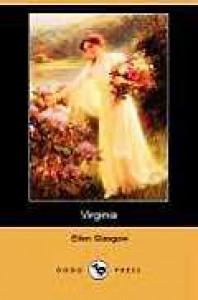
I read this book for my “Best of 1913” project, but I have more than a few sentences to say about it. Why is this masterpiece completely forgotten while people are reading all this garbage by William Faulkner? Could it be the clanking, undying machinery of sheer sexism?
Virginia tells the story of a woman who lives in the ignorant backwater of Dinwiddie, Virginia. It opens in the 1880’s when Virginia has just graduated from the Dinwiddie Academy for Young Ladies and she’s eager to fall in love and enjoy life to the fullest. Ellen Glasgow paints a very compelling picture of a town whose white citizens are willing to lay down their lives for Southern ideals a) which they don’t understand and b) the ideals are completely stupid. Still, Glasgow likes these benighted people and presents them as loveable. I really did feel for these characters. Virginia has received a terrible education that was designed to make her obedient and well-mannered, and she doesn’t realize that she shares the fate of her mother and all the other women she knows, of throwing her life away in service to some man. Then she crosses paths with the first young man she has ever met who is handsome, intelligent, and not her cousin. (This has been a common theme of the books of 1913 that I’ve read so far—marrying the first eligible man you lay your eyes on. We are so lucky that today we get to meet lots of people and do ordinary things like go to school with them.) After Virginia and her beloved meet five times, they become engaged.
The man in question, Oliver, is an interesting character. He’s from out of town and he’s different from everyone in Dimwittie because he believes in art and science while they believe in Christianity, how awesome they were during the Civil War, keeping up appearances, and making a buck. His greatest dream is to be a writer; he scorns money and working; and he reads things like The Origin of Species. Although he’s intelligent and original, he’s also very selfish and basically has no empathy or insight into other people’s feelings. Don’t we all know people just like this? What a fully realized character! He resists falling in love with Virginia because he can see that supporting a wife will hamper his wannabe Bohemian lifestyle, but then he succumbs, and so he has to take a normal job and become interested in making money, just like everyone else. Throughout the novel he writes plays, which at first are complete flops. Then he decides to sell out and pander to the tastes of the Broadway audiences, and by the end of the book he has become an incredibly successful playwright, but he scorns his own work. I thought it was very clever of Ellen Glasgow not to even get into the question of whether Oliver’s writing is any good or not. She presents his POV and just leaves it at that.
Ultimately the portrayal of Oliver is of a person who has all these great qualities but is emotionally stunted to the point where he basically has no connection to his wife and children, yet he is in the typical range of males. Based on what I see in Redbook magazine, this problem is as prevalent today as it was a century ago. Virginia, meanwhile, is ignorant on every subject and isn’t curious about the world and has no time for rational thinking, but she can see with extraordinary sensitivity an entire realm of human psychology that is a closed book to Oliver. He’s impatient with her because all she cares about are her children and making the house look nice and managing the servants. He also gets cross that she doesn’t dress nicely anymore and has allowed her hands to get rough and coarsened—even though this has only happened because she’s been scrimping and pinching to make ends meet. Apparently the Southern gentlewoman wasn’t supposed to do any actual housework herself, but when she was too poor to afford servants she was supposed to do all the work secretly and still manage to look dainty and fresh.
The foil to Virginia’s simplicity and self-effacing nature is her best friend, Susan. Susan is naturally curious and forceful and thinks for herself. Her dream is to go to college, but her father won’t hear of it. (“Father, I want to go to college.” “If you want something to occupy you, you’d better start about helping your mother with her preserving.” “I put up seventy-five jars of strawberries.” “Well, the blackberries are coming along.”) To make the parallel exact, just as Oliver chooses a wife who is not his intellectual equal, Susan loves John Henry, a stolid, dull-witted man. But Susan and John Henry seem happy together and neither of them goes running around with fast actresses. Susan fills her life with charities and public movements and reading books. It seems to be enough.
(Virginia and Susan really are good friends! Listen to this:
“Promise me, Jinny, that you’ll never let anybody take my place,” she said, turning when they had reached the head of the steps.
“You silly Susan! Why of course they shan’t,” replied Virginia, and they kissed ecstatically.
“Nobody will ever love you as I do.”
“And I you, darling.”)
(But don’t worry, Virginia and Oliver’s love gets equal time:
“The world stopped suddenly while a starry eternity enveloped them. All youth was packed into that minute, all the troubled sweetness of desire, all the fugitive ecstasy of fulfilment.” You think they’re doing something really naughty, but actually it’s their first kiss.)
OK, I’m making fun of an overblown love scene, but they’re hard to do, and I really admire Ellen Glasgow’s writing. I wish I could write like her. Not just that I wish I could write such wonderful descriptions and could chivvy the plot along like she does while revealing meaningful things about the human condition. I wish I were “allowed” to write like her, with an omniscient third person narrator that tells you what’s right and wrong while letting you to see into the character’s hearts. If only that were still the fashion!
The one clunky part of the book was a transition when Virginia and Oliver are moving back to Dimwittie after an absence of five years, and we’re brought up to speed with dialogue like, “Isn’t it beautiful that her marriage has turned out so well?” I thought the most affecting parts were when Virginia’s mother dies (sorry for the spoiler. . . no wait, I’m not sorry) and when her son is very sick. Glasgow rips aside the veil and shows us that there’s little or no meaning to life but still we have to march along and invent meaning if we can. One of Virginia’s daughters leads a very different life from her mother because she goes to college, loves learning, has “modern ideas,” and scorns the feminine tradition of self-sacrifice. Too bad she’s also completely selfish and doesn’t care about her mother. Glasgow portrays the daughter’s modern views as correct but too late and of no help to someone like Virginia who is mired in tradition. Although the novel’s ending is grim, I was glad there was a ray of hope for Virginia.
The Achilles heel of this novel is exactly what you would expect of a novel about Southern life in the late nineteenth and early twentieth century: racism. When describing the African-American characters (all minor characters), there’s a lot of “primitive” this, “savage” that, “wild animal” this, such-and-such “creature.” Also some speech rendered in offensive dialect and one use of a racial slur (in dialogue or maybe a letter, not from the narrator’s POV.) The sad thing is that clearly Ellen Glasgow was liberal-minded and held the progressive views of her day, when a big civil rights issue was trying to get someone in power to do anything at all to stop lynching. So basically this kind of racist claptrap was as anti-racist as a book by a white person got at the time.
Here’s a spoiler for you—Virginia’s father dies preventing a lynching. No one lionizes him for it, and it may be that none of the white characters even know what happened. Just as Virginia has Susan as her opposite number, Virginia’s father has Cyrus Treadwell as his foil. They were buddies in the Civil War but while Virginia’s father is good and spiritual, Cyrus Treadwell is mean and greedy. An African-American washerwoman, Mandy, keeps appealing to Cyrus Treadwell to help her, the subtext being that he is the father of her son, conceived when she was a fifteen-year old servant in the Treadwell house in 1866. This is depicted so subtly that I wondered if I was imagining it until later in the book when it becomes slightly more explicit. Clearly Glasgow wants to condemn abusers like Cyrus Treadwell but the topic is too hot for her to approach it directly.
In conclusion, I thought this book was terrific and I think it deserves a greater reputation than it has. A lot of other books (by men) with some creepy racist elements are still regarded as worth reading so why not this one? I read the Penguin Classic edition and after I was done I read the introduction, which was, as always, somewhat bananas. This academic, in 1989, really thought it was totally fine to use the word “mulatto”? But I learned a few interesting tidbits about Ellen Glasgow and her family. Her sister Cary led a cheerless existence and after her husband (and her brother) died by suicide she devoted her life to reading books her husband had liked so that when they were reunited in the afterlife they would have something to talk about. Whaaat? But then I thought about it some more, and it makes as much sense as anything else. What are you supposed to do in that situation? Why am I reading the books of 1913? Why does anyone do anything?
Book design and all that: It looks like all the Penguin Classics of the pre-2002 template with the red top of the spine that means it’s in English. The cover art, a painting by Mary Cassatt, is very appropriate. Some typos.
Other book similar to this: The Life and Death of Harriet Frean by May Sinclair.
Theme song: The Ballad of Lucy Jordan by Marianne Faithfull
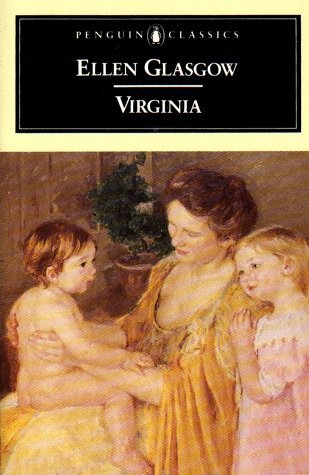
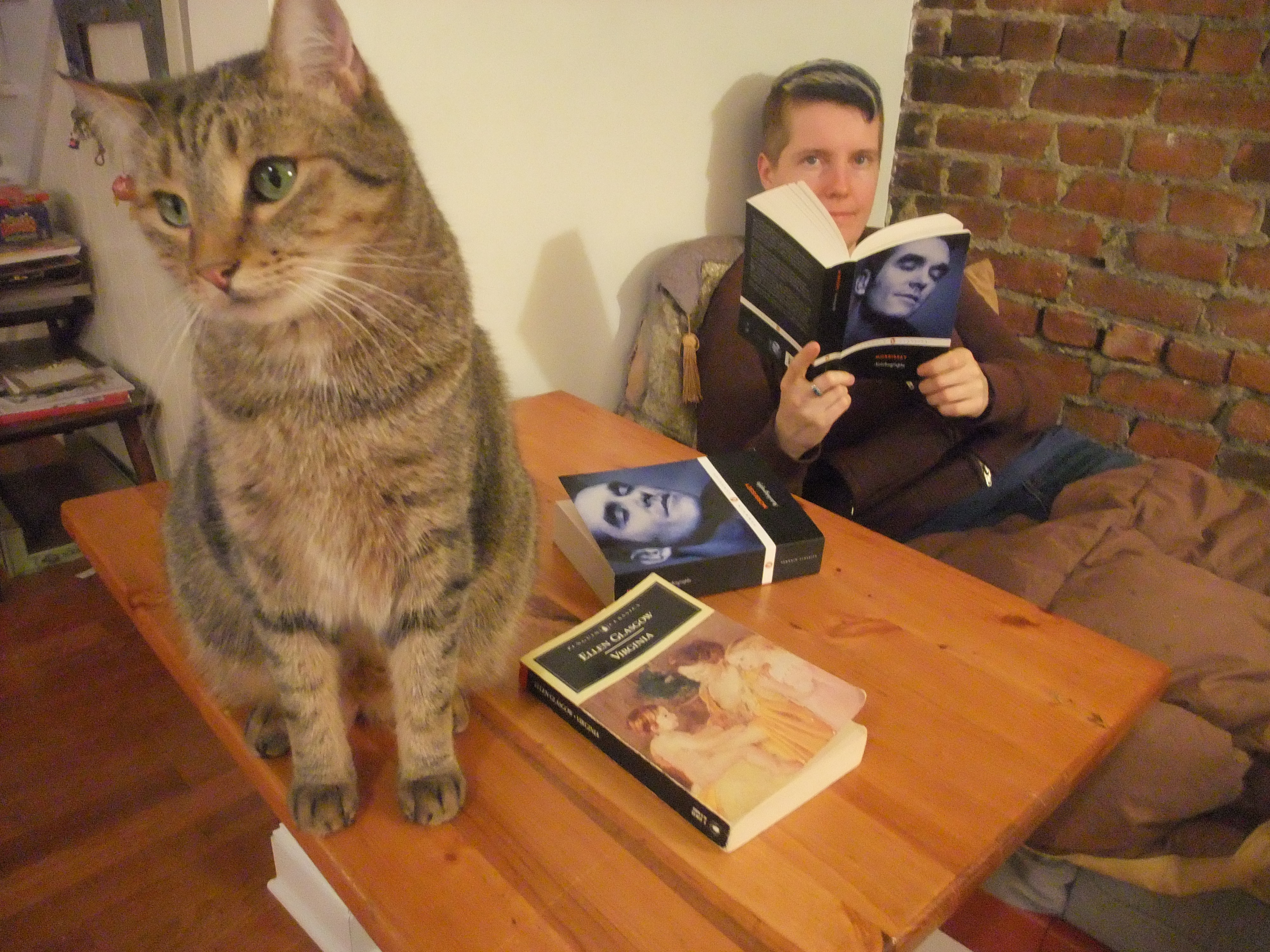



Wow, this reprint of a 1956 bestseller is dynamite! I’ll just tell you what happens in the first chapter: Fifteen year old Courtney (this novel is what led to Courtney becoming a popular girl’s name, just as Charlotte Bronte gave us Shirley as a girl’s name, both names originally being for boys) lounges around with her naked roommate Janet and tells her about how her parents each thought the other was taking her for vacation so she got stuck at boarding school. Janet warns Courtney that she’s gone overboard in her crush for a female teacher and that she’ll end up queer. Courtney goes to meet with this teacher, Miss Rosen. They talk a little about Finnegan’s Wake and Courtney tells her that she doesn’t think of herself as a woman and ever since she can remember she’s been male in her dreams. Then Miss Rosen tells her she doesn’t want to spend time alone with Courtney anymore because Courtney should make friends with her peers, and Courtney is devestated.
The novel follows Courtney for about two years from boarding school to Hollywood to NYC’s Upper East Side. I think I enjoyed this novel more as an adult than I would have as a teenager, because when I was a kid I got frustrated by stories where people were supposed to be “sophisticated” and that meant being exploited, abused, depressed, and constantly drunk. Parts of Chocolates for Breakfast seem very authentic and true to life, and other parts seem like a naive young person’s idea of what ought to be in a shocking novel. But since I was not alive during the 1950’s I could have the two completely backwards.
The story of the author Pamela Moore, who was eighteen when this novel was originally published and dead by suicide at 26, is as interesting as the novel. I get the impression that being a teenaged internationally-bestselling writer isn’t as sensational an experience as you’d think. She wrote several more novels, but they didn’t do well. When she died, she left behind a husband and baby son. At the end of the book there are some interesting essays on Pamela Moore, including one by her son. There are also some manuscript pages of material that was cut from the book either by Moore herself, her editor, or her agent, mostly homoerotic passages about Miss Rosen and stuff about suicide.
I love seeing a forgotten classic back in print and ready to be enjoyed by a new generation, especially a forgotten classic by a woman writer. I really wish I could discuss this book with my mom, who was born just one year earlier than Pamela Moore and most likely read this book. But the world is not a wish-granting factory &c.
The part where I complain querulously about trivial matters: I feel a reprint should not have so many typos. Also, what’s going on with the cover, which seems to be a stock photo of a contemporary girl in contemporary clothes? The cover does not say 1950s or, well, anything, to me.
Theme song: Gloomy Sunday by Billie Holiday
Other book like this one: The Bell Jar by Sylvia Plath, just a little bit.
Trigger warning for: neglectful parents, M/C being molested by various men (“having an affair”), dating violence, frequent use of homophobic slurs, bisexual character who hates himself for not being a real man, cutting, being in the bin (“sanitarium”), casual mention of date rape, abusive parents, mentally ill parents, and suicide.
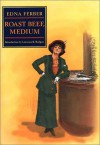





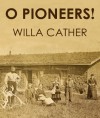

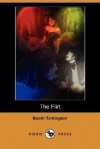

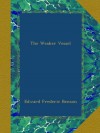








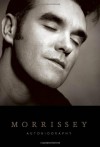



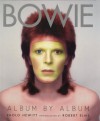


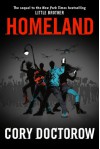
















![Hit Me (Keller) by Block, Lawrence (1st (first) Edition) [Hardcover(2013)] - Lawrence Block](http://booklikes.com/photo/max/100/150/upload/books/71/92/0b425830ae546cffd44b5a342d54db4a.jpg)
